
- Customer Service
- Graduate Jobs
- Information Technology
- Cover Letter
- Interview Process
- Interview Type
- Social Media
- What Should I Wear
- Job Related
- Personal Brand
- Previous Job
- Problem Solving
- Weakness and Strength
- Questions to Ask
- Interview Skills
- Common Mistakes
- Salary Negotiation

Behavioral Interview Questions About Problem Solving
“A problem is a chance for you to do your best .” Duke Ellington
Great problem solvers tend to be people with a healthy attitude to change and an open mind when it comes to new ideas. You either drown in the problem or you look at it as an opportunity for you to do your best work. Every workplace has problems, that’s life. Employers look for people who have solid problem solving strategies that they use to work through any workplace problems that arise.
Basic Questions About how You Go About Problem Solving:
Every job interview will have one or more questions about how you go about problem solving. If the role you are applying for is comprised largely of routine work you may just be asked a basic interview question like the ones below.
Off course the answer is always – ‘Yes I am a problem solver” but you need to do much more than just that. You need to explain how you go about problem solving. What is your strategy? What steps do you follow? These things matter.
- Are You a Problem Solver?
- How Do You Go About problem Solving?
Specific Behavioral Interview Questions About Problem Solving:
Most interviewers will ask very targeted behavioral interview questions to understand exactly how you go about problem solving. The following are 9 behavioral interview questions about how you approach problem solving in the workplace.
Before you click to see sample answers, see if you could answer these behavioral interview questions by yourself first.
1. Tell me about a situation where you had to solve a difficult problem. What did you do? What was the outcome? What do you wish you had done differently?
Sample answer to how you are a problem solver .
2. Describe a situation in which you recognized a potential problem as an opportunity. What did you do? What was the result? What, if anything, do you wish you had done differently?
Sample answer to how to show that problems are just opportunities in disguise .
3. What steps do you follow to study a problem before making a decision? Why?
Sample answer to how you would problem solve before making a decision .
4. Give me an example of a time you discovered an error that been overlooked by a colleague. What did you do? What was the outcome?
Sample answer on how you would tell colleagues they made a mistake .
5. What problem solving strategies do you use to stay aware of problems and resolve them in your work area? Can you give me an example of how this has worked for you in your current role?
Sample answer to show your problem solving strategies .
6. Describe the biggest work-related problem you have faced in the past 12 months. How did you handle it?
Sample answer to show how you handle biggest work related problems .
7. Can you tell me about a time where you have been caught unaware by a problem or an obstacle that you had not foreseen? What happened?
Sample to show how you deal with unexpected workplace problems .
8. Tell about a time when you were able to develop a different problem-solving approach. What steps did you follow?
Sample answer to show how your problem solving strategies .
9. Tell us about a time when you identified a potential problem and resolved the situation before it became a serious issue.
Sample answer to show you can identify problems and solve them .
10. Give a specific example of a time when you used good judgment and logic in solving a problem.
Sample to show how you use logic to solve work problems .
Related Posts
- Making The Right Decision When You Have Multiple Options April 1, 2018
- 5 Types of Decision Making Skills You Need To Know July 31, 2017
- How To Answer Behavioral Interview Questions July 26, 2017
- The Secret to Setting Goals and Achieving Them July 11, 2017
MORE JOB INTERVIEW TOPICS
- Achievements
- Behavioural
- Communication
- Company Research
- Difficult Questions
- Interesting
- Outside Work
- Personal Skills
- Presentation Skills
- Prioritisation
- Question Type
- Quitting Your Current Job
- Repetitive Tasks
- Scheduling an Interview
- Time Pressure
- Tips and Interview Process
- Uncategorized
- Unemployment
ACE YOUR JOB INTERVIEW

How to Answer 11 Common Behavioral Interview Questions
By Status.net Editorial Team on June 16, 2023 — 17 minutes to read
- Why Employers Use Behavioral Interview Questions Part 1
- How to Use the STAR Method to Answer Behavioral Interview Questions Part 2
- Common Behavioral Interview Questions Part 3
- How to Answer 11 Common Behavioral Interview Questions Part 4
- Conflict Resolution: Best Answers Part 5
- Managing Multiple Priorities: Best Answers Part 6
- Adapting to Change: Best Answers Part 7
- Solving a Problem with Limited Resources: Best Answers Part 8
- Leadership and Teamwork Behavioral Interview Answers Part 9
- Time Management and Organization Interview Answers Part 10
- Communication Behavioral Interview Answers Part 11
- Tips: How to Answer Behavioral Interview Questions Part 12
Part 1 Why Employers Use Behavioral Interview Questions
Behavioral interview questions are designed to help employers gauge how candidates might react in certain situations based on their past behavior.
Employers use behavioral questions because they believe past behavior is an excellent predictor of future performance. By understanding how you’ve handled situations in the past, they can better determine your fit for the role and the company culture. These types of questions typically start with phrases like “Tell me about a time when…” or “Describe a situation where…”
There are also situational interview questions that usually begin with “Imagine you’re in this situation…” or “What would you do if…?” . Learn more: How to Answer 9 Common Situational Interview Questions
Skills and Qualities Assessed
Behavioral interview questions can assess various skills and qualities depending on the job requirements. Some common skills and qualities assessed through these questions include:
- Communication: Your ability to convey information clearly and concisely to others.
- Teamwork: How effectively you collaborate with team members on projects and tasks.
- Problem-solving: Your approach to identifying and addressing challenges in your work.
- Adaptability: How you handle change and adapt to new situations.
- Conflict resolution: Your ability to manage conflicts and resolve differences in a professional manner.
- Decision-making: Your process for making decisions and weighing options.
- Leadership: Your ability to motivate, guide, and inspire others.
Identifying Key Skills and Qualities
Before attending an interview, review the job description and list the required skills and qualities. Evaluate your past work experiences and decide which situations demonstrate those skills. This will allow you to systematically express why you are a suitable candidate for the position.
Part 2 How to Use the STAR Method to Answer Behavioral Interview Questions
The STAR method (Situation, Task, Action, Result) is a helpful tool for structuring your responses to behavioral interview questions. Begin by describing the situation you encountered, followed by the task you needed to accomplish. Then explain the action you took to address the situation and the result of your actions.
Question: “Can you tell me about a time when you had to overcome a difficult challenge in the workplace?”
Situation : “ Sure, I remember a time when I was working on a project for a client, and we were facing a tight deadline. One of my team members unexpectedly had to take a leave of absence, leaving us short-staffed.”
Task : “ As a result, I had to step up and take on some of their responsibilities in addition to my own.”
Action : “I immediately took stock of the situation and prioritized the tasks that needed to be completed. I also communicated with the rest of my team to ensure that everyone was aware of the changes and that we were all on the same page. I then worked long hours and weekends to ensure that we met the deadline.”
Result : “As a result of my actions, we were able to complete the project on time and to the client’s satisfaction. My team members were also appreciative of my efforts and we were able to build stronger relationships as a result.”
This answer demonstrates your ability to take initiative, prioritize tasks, communicate effectively, and work collaboratively with your team to overcome a difficult challenge in the workplace.
Crafting Your Anecdotes
Develop a series of concise, engaging anecdotes that highlight your accomplishments, skills, and experiences. Be sure to tailor your stories to the job description by focusing on situations that demonstrate the required skills. Practice these anecdotes to become more comfortable sharing them during your interview.
Remember to keep your anecdotes brief, relevant, and truthful. Use a confident, knowledgeable, neutral, and clear tone of voice as you share your experiences.
Part 3 Common Behavioral Interview Questions
By reflecting on your past experiences, you’ll be better equipped to confidently address these behavioral interview questions during an interview.
- Can you describe a time when you had to work under pressure?
- Tell me about a time you had to deal with a difficult coworker and how you handled it.
- How have you handled a tight deadline in the past?
- Can you give an example of when you had to collaborate with team members who had different opinions?
- Describe a situation where you had to make a difficult decision at work.
- How do you manage your time and prioritize tasks when working on multiple projects simultaneously?
- Can you provide an example of when you went above and beyond to deliver a project or help a client?
- Have you ever had to deliver bad news or negative feedback to a colleague? How did you approach this situation?
- Share an instance in which you had to take a calculated risk to achieve a goal.
- How do you stay organized and maintain attention to detail in your work?
- Describe a time when you had to adapt to a significant change at work.
- Can you discuss a situation where you faced an ethical dilemma and how you dealt with it?
- Tell me about a time you failed at a task or project – what did you learn from it?
- Explain how you’ve utilized your problem-solving skills in the workplace.
- Share an example of when you had to deal with competing priorities.
- How do you demonstrate leadership and motivate team members?
- Can you describe a time when you had to persuade someone to agree with your idea or decision?
- Tell me about a time when you made a mistake and had to take responsibility for it.
- How do you handle conflict resolution in a professional setting?
- Describe a situation where you had to deal with ambiguity.
- Can you discuss a time when you proactively identified a problem and implemented a solution?
- Tell me about a situation when you had to manage a project with limited resources.
- How do you go about delegating tasks to team members?
- Describe an instance where you had to learn a new skill or technology quickly to meet a deadline or goal.
- How do you handle constructive criticism?
- Share an example of when you took the initiative to improve a process or workflow at work.
- Can you describe a time when you had to use your communication skills to resolve a misunderstanding or miscommunication?
- Tell me about an instance when you had to develop a rapport with a new team member or client quickly.
- How do you manage stress and maintain a work-life balance?
- Describe a time when you worked as part of a diverse team and what you learned from that experience.
These questions aim to uncover your skills, experience, and most importantly, your ability to navigate various situations in the workplace.
Part 4 How to Answer 11 Common Behavioral Interview Questions
- Describe a time you faced a tight deadline. How did you manage your time? Your answer can highlight your ability to prioritize tasks, allocate extra time for critical projects, and utilize resources efficiently to ensure timely completion of your work.
- Describe a difficult decision you had to make in the workplace. How did you tackle it? Emphasize your ability to consult with relevant stakeholders, analyze data, and weigh the pros and cons of each option before making a well-reasoned decision.
- Describe a time when you had to adapt to a significant change at work. How did you manage it? Your answer should show your resilience and flexibility by talking about how you stayed composed during the transition, embraced the change, and sought training or resources when needed.
- Describe a moment when you had to exhibit leadership during a challenging situation. Your answer should emphasize the qualities of strong leadership: clear communication, confidence, setting and achieving goals, and inspiring your team to overcome the challenge.
- Have you ever dealt with a manager who gave unclear instructions? How did you resolve the situation? You might mention politely asking for clarification, paraphrasing their instructions to ensure understanding, and suggesting ways to improve communication in the future.
- Describe a time when you had to step out of your comfort zone at work. How did you handle it? Your response could focus on your willingness to take risks, learn from new experiences, and adapt to new situations while maintaining your commitment to your job.
- Have you ever had to work with an uncooperative coworker? How did you approach the situation? You could discuss the importance of understanding their perspectives, finding common ground, and fostering collaboration to achieve the best results for the team.
- Describe a time when you had to persuade someone to see things your way. What tactics did you employ? Mention your ability to listen, provide facts and data to support your argument, and demonstrate empathy while focusing on the benefits of your approach for all parties involved.
- Describe a time when you had to multitask. How did you manage multiple priorities? Discuss your use of time management techniques, such as creating to-do lists, setting goals, and delegating tasks when necessary, to ensure you effectively managed multiple priorities.
- Describe a time when you voluntarily took on additional responsibilities. How did you manage the extra workload? Your answer should showcase your proactive nature, time management skills, and ability to step up when needed while ensuring your primary tasks remain a high priority.
- Have you ever had to make a decision with limited information? How did you handle it? You could mention how you relied on intuition, sought input from others, and were prepared to change plans when new information became available.
Example Answers to Common Behavioral Interview Questions
Part 5 conflict resolution: best answers, “can you share an example of how you dealt with a conflict among team members”.
1. “In a previous role, I was part of a team that had a disagreement about the best approach to a project. To resolve the conflict, I scheduled a meeting with all team members to discuss their concerns and perspectives. I encouraged open and honest communication and facilitated a productive discussion. We were able to reach a compromise that everyone was happy with, and we successfully completed the project on time and within budget.”
2. “I once encountered a conflict among team members who had different ideas on how to prioritize tasks. To resolve the conflict, I scheduled a team meeting to discuss the issue and understand each team member’s perspective. I then worked with the team to develop a prioritization plan that incorporated everyone’s input. By doing so, we were able to reach a consensus and successfully complete the project on time.”
3. “In a previous role, I encountered a conflict among team members who had different work styles and were struggling to collaborate effectively. To address the issue, I scheduled a team-building exercise that focused on developing better communication and collaboration skills. Through this exercise, we were able to build stronger relationships and work more effectively as a team.”
Part 6 Managing Multiple Priorities: Best Answers
“describe a situation where you had to manage multiple priorities. how did you handle it”.
1. “In my previous role, I was responsible for managing multiple projects with competing deadlines. I prioritized my tasks based on the level of importance and urgency. I also made sure to communicate with my team and stakeholders regularly to ensure everyone was aware of the progress and any potential issues. I was able to successfully complete all projects on time and within budget.”
2. “I once had to manage multiple priorities while working on a tight deadline. To handle this situation, I created a detailed project plan that outlined all tasks and deadlines. I then delegated tasks to team members based on their strengths and availability. I also made sure to communicate regularly with my team and stakeholders to ensure everyone was aware of the progress and any potential issues. By doing so, we were able to successfully complete the project on time and within budget.”
3. “In a previous role, I was responsible for managing multiple client accounts with different needs and priorities. I made sure to prioritize tasks based on the level of importance and urgency, and I also worked closely with my team to ensure that everyone was aware of the priorities and deadlines. By staying organized and focused, we were able to successfully meet all client needs and exceed their expectations.”
Part 7 Adapting to Change: Best Answers
“tell me about a time you had to adapt to a major change in the workplace.”.
1. “In my previous role, our company underwent a major restructuring that resulted in changes to our team’s responsibilities and reporting structure. To adapt to this change, I took the initiative to learn about the new structure and my new role. I also worked closely with my team members to ensure a smooth transition. By embracing the change and being proactive, I was able to successfully adapt to the new workplace environment.”
2. “I once worked for a company that implemented a new technology platform that changed the way we worked. To adapt to this change, I took the initiative to learn about the new platform and its capabilities. I also worked closely with my team members to ensure that everyone was comfortable using the new technology. By being open-minded and proactive, I was able to successfully adapt to the new workplace environment.”
3. “In a previous role, I worked for a company that underwent a major shift in its business strategy. To adapt to this change, I took the initiative to learn about the new strategy and how it impacted my role. I was able to successfully adapt to the new workplace environment and contribute to the company’s success.”
Part 8 Solving a Problem with Limited Resources: Best Answers
“share your experience in solving a problem with limited resources.”.
1. “In a previous role, I was tasked with managing a project with limited resources. I identified the critical tasks and prioritized them based on their importance. I also looked for creative solutions to reduce costs and increase efficiency, such as leveraging open-source software and outsourcing non-essential tasks. By being resourceful and strategic, I was able to successfully complete the project within budget and on time.”
2. “I once encountered a problem with limited resources while working on a marketing campaign. To solve this problem, I focused on the most impactful marketing channels and optimized them for maximum results. I also looked for ways to leverage existing content and repurpose it for different channels. I was able to successfully execute the campaign and exceed the client’s expectations.”
3. “In a previous role, I was responsible for managing a team with limited resources. To solve this problem, I first assessed the team’s strengths and identified areas for improvement. I then developed a training and development plan that focused on building the team’s skills and empowering them to take on more responsibilities. I also looked for ways to streamline processes and eliminate inefficiencies. We were able to successfully meet our goals.”
Part 9 Leadership and Teamwork Behavioral Interview Answers
Question: Describe a time when you had to lead a team to achieve a goal. How did you motivate and guide them? Answer : In my previous role as a project manager, I led a team of five to complete a critical deadline within three weeks. To motivate and guide the team, I held daily check-ins, ensured open communication, and celebrated small milestones.
Question: Can you share an example of how you demonstrated leadership skills when working with a group? Answer : During a team-building activity, I noticed that our group lacked direction. I stepped up to coordinate tasks and assigned roles to each member based on their strengths, ultimately leading to a successful completion of the assignment.
Part 10 Time Management and Organization Answers
Question: How do you prioritize tasks when faced with multiple urgent assignments? Answer : I create a list of tasks, then rank each item based on importance, deadline, and effort. I tackle the high-priority assignments first, and also break them down into smaller tasks to make the workload manageable.
Question: Describe a situation where you had to juggle multiple responsibilities effectively. How did you handle it? Answer : As a marketing coordinator, I was responsible for managing an event, creating social media content, and designing a newsletter at the same time. I used a project management tool to plan my tasks, set deadlines, and track progress. By staying organized and maintaining open communication with stakeholders, I efficiently completed all responsibilities.
Part 11 Communication Behavioral Interview Answers
Question: Describe a time when you resolved a conflict between team members. What was your approach? Answer : Two team members had a disagreement about project execution, leading to tension and delays. I facilitated a meeting for open discussion, allowing each party to express their concerns. After understanding both perspectives, I helped them reach a compromise that satisfied both and allowed the project to move forward.
Question: Can you share an example of how you improved communication within a team or with external stakeholders? Answer : As a project lead, I noticed that emails between team members had created confusion and misinterpretation. I proposed implementing a communication platform for real-time collaboration, leading to improved communication and reduced response time among the team.
Part 12 Tips: How to Answer Behavioral Interview Questions
Sharing your success stories.
When answering behavioral interview questions, start by sharing your success stories. Think of situations where you demonstrated initiative, made an impact, or solved a problem under pressure. Use the STAR method (Situation, Task, Action, and Result) to structure your response: briefly describe the situation, what your responsibility was, the actions you took, and the positive results that followed. Be concise and focus on the specific actions that demonstrate your abilities.
Demonstrating Soft and Technical Skills
It’s essential to showcase both your soft and technical skills during behavioral interviews. To do this, include examples that highlight your communication, teamwork, leadership, and time management abilities, as well as your expertise in your field. Use specific anecdotes to show how you’ve applied these skills in real-life situations, and be prepared to explain how they have contributed to your success.
Discussing Conflicts and Failures
Not every behavioral interview question will focus on your successes. Some questions may ask about conflicts or failures you’ve experienced. It’s important to be honest and show how you’ve grown from these moments. Describe the situation, your role in it, and the steps you took to address the issue. Highlight the lessons you’ve learned and how you’ve applied them to improve in your role. Remember, it’s okay to discuss setbacks as long as you demonstrate a growth mindset and your ability to adapt.
Frequently Asked Questions
How can i prepare for a behavioral competency-based interview.
To prepare for a behavioral competency-based interview, review the job description and identify the key competencies required for the role. Next, think of specific examples from your past experiences that demonstrate your ability to showcase these competencies. Practice using the STAR method to structure your answers and remember to be specific, concise, and honest.
What techniques can be used in preparation of behavioral interview questions?
Some techniques to prepare for behavioral interview questions are:
- Identify key competencies for the job role.
- Reflect on your past experiences and identify relevant examples.
- Structure your answers using the STAR method.
- Practice your responses out loud and with a friend or family member.
- Anticipate follow-up questions and prepare your responses accordingly.
Can you provide some examples of behavioral interview questions for freshers?
For freshers, interviewers may focus on questions related to teamwork, adaptability, or problem-solving, such as:
- Tell us about a group project you worked on during your studies.
- Describe a challenging situation you faced in college and how you overcame it.
- Explain how you have adapted to a new environment or situation.
What are some common behavioral questions for managerial positions?
Common behavioral questions for managerial positions can include:
- Describe a time when you had to deal with a conflict within your team.
- How have you successfully managed a large project or team in the past?
- Explain how you have motivated your team or an individual employee to achieve their goals.
- Tell us about a time when you had to make a difficult decision and its impact.
Preparation is key when it comes to tackling behavioral interview questions. To ensure you’re adequately equipped for the interview, familiarize yourself with some of the most common questions of this type, and take the time to reflect on your own experiences and how they relate to the position you’re applying for.
Related: How to Answer 9 Common Situational Interview Questions
36 Smart Answers to “What Makes You Unique?”
- Management Styles Interview Questions [Example Answers]
- 7 Important Marketing Interview Questions (And How to Evaluate Answers)
- 26 Examples of Smart Questions to Ask in an Interview
- How to Answer 9 Common Situational Interview Questions
- Interview Follow-up Email Examples (1-2-3 weeks)
- Job Interview Request Email Responses (Detailed Examples)
Top 50 Behavioral Interview Questions and Answers
Mike Simpson 0 Comments

By Mike Simpson
Updated 6/5/2022.

Most job seekers know that they’ll face off against some behavioral interview questions during their next interview. But knowing which ones you’ll encounter – and how to approach answering them – is the essential part of the equation. That way, you’ll be ready for what the hiring manager is likely to ask, increasing the odds that you’ll impress.
Are you ready to check out the world of behavioral-based interview questions? Here’s what you need to know.
What Are Behavioral Interview Questions?
Before we look at some behavioral interview questions and answers, let’s talk about what these types of questions are and why they come up.
In the simplest sense, a behavioral interview question gauges how you think and act in various situations. Many questions of this kind focus on scenarios, requiring you to outline what you did (or would do) under specific circumstances.
There’s a good reason why hiring managers turn to these questions during an interview. Unlike traditional interview questions – which mainly assess whether you have particular technical capabilities – these give the hiring managers overviews of capabilities that are harder to ask about directly.
Usually, your answer helps the hiring manager assess your mindset and soft skills . Plus, they’ll learn more about the hard skills you use to handle challenges or address problems of a particular nature.
In some cases, hiring managers ask behavioral interview questions because they think past performance is a predictor of future success. However, whether that’s true isn’t actually clear.
One report indicated that prior work experience – essentially, past behavior – didn’t guarantee a solid performance at a new company, even if the new hire had related experience. But a different study showed that behavioral interviewing was 55 percent predictive of future behavior at work, while traditional interviews were a mere 10 percent predictive.
Since 73 percent of hiring professionals use behavioral interviews, it’s best to be ready regardless. That way, you can excel when those questions become part of the equation.
How to Answer Behavioral Interview Questions
When it comes to how to answer behavioral interview questions, you need to present applicable examples. It could be describing a moment from your past or outlining the steps you’d take based on a theoretical scenario.
In either case, you need a strong strategy for creating a meaningful response. What’s the best way to get started? By getting to know the STAR Method.
STAR stands for Situation , Task , Action , Results . Essentially, it’s a framework for your answer. First, you’ll outline a situation that applies to the question. Next, you’ll discuss the task you had to undertake, followed by a description of what you did, including the skills you used along the way. Finally, you’ll dive into the result, summarizing the outcome.
That’s the gist of the STAR Method. Based on what you’ve likely learned about behavioral interview questions, you can like see why people sometimes refer to them as STAR interview questions.
If you want to learn more, you can check out our in-depth article on the STAR Method for a deep dive into how to use it effectively.
After you get comfortable with the STAR Method, it’s time to add the Tailoring Method to the mix. The Tailoring Method is all about relevancy, ensuring your answer directly speaks to the hiring manager’s needs. That way, your response isn’t just compelling; it also positions you as an exceptional match for the precise role the hiring manager is filling.
In fact we we wanted to let you know that we created an amazing free checklist for behavioral questions that covers all the critical info you need when dealing with these tricky types of job interview questions!Click below to get your free PDF now:
CLICK HERE TO GET THE BEHAVIORAL INTERVIEW CHECKLIST
How to prepare for behavioral interview questions.
Preparing for behavioral interview questions might seem challenging, but it’s far simpler when you realize that the biggest step is to have a few stories ready. In most cases, you want to begin working out what to share by reviewing the job description.
In the end, developing fantastic answers for STAR method interview questions starts with relevancy. By choosing moments from your career or education that apply to the job and the situations presented in the question, you can start using the STAR and Tailoring Methods to form great answers.
Another important tip is to make sure each of your stories has a formal conclusion. After giving them the results, tell the hiring manager something about what you learned from the experience or how it continues to shape you as a professional. That gives your answer a bit of something extra.
Top 10 Common Behavioral Interview Questions and Answers
1. tell me about a time when you had to juggle multiple priority tasks. how did you decide where to begin.
This question helps the hiring manager assess a few things. Along with your ability to handle stress, it lets them learn more about how you organize your work when you have multiple critical activities on your plate.
EXAMPLE ANSWER:
“In my last administrative assistant position, I was given two high-priority tasks from two different managers I supported. The deadlines for each were tight, and both projects were vital, so the nature of the duties alone wasn’t enough to establish how I should approach the situation.
“To figure out how to proceed, I took a moment to outline the required steps for both tasks. This allowed me to estimate the time necessary while also ensuring I wouldn’t overlook something critical.
“I then decided to start with the duty that had the lowest amount of time required. My main reason is that one could be completed in hours and the other would take a few days. By choosing the shorter one first, I could fully wrap up that responsibility, eliminating the need to provide updates in the coming days on that assignment, giving me more time to focus on the tasks themselves, and allowing me to complete both by the deadline.”
2. How do you manage stress on the job?
Workplace stress can harm an employee’s performance. As a result, hiring managers want to know what you do to keep yourself calm and level, even when you’re faced with challenges.
“While I’ve found that some stress actually pushes me to be my best, it’s also essential to ensure that my stress levels remain reasonable. One approach I’ve found that works for me is focusing on organization.
“I’m a big fan of breaking large responsibilities down into small tasks, making them feel more manageable and giving me a roadmap to follow. For a recent project in my current job, I divided the work up into ten micro-goals. Then, I blocked out time on my calendar for every activity. Not only does this keep me on target, but it also reduces the odds that I’ll feel overwhelmed.
3. Tell me about a time when you had a conflict with a coworker. How did you navigate the situation?
This is one of the most common behavioral interview questions because hiring managers want to know that you can navigate the typical disagreements that can occur at work. It’s also a way to gauge your interpersonal skills and self-reliance.
“While in my current job, I was part of a project team that was tasked with coming up with a new campaign for a client. A coworker and I didn’t see eye-to-eye on the direction the campaign should take when it came to the tone, leading to some conflict.
“To address the issue, I requested a meeting with my coworker to discuss their perspective. My goal was to understand why they were adamant about that approach, asking clarifying questions and rephrasing what they shared to ensure I saw the complete picture.
“Then, I did the same, sharing my perspective in a calm, professional manner. This led us to a very beneficial discussion, one where we both saw the merits in the other’s strategy. Ultimately, this allowed us to work together to create the best possible campaign, one that boosted the client’s sales by 15 percent.”
4. Describe a time when you had to adapt quickly to a change in priorities.
Regardless of whether a workplace is fast- or slow-paced, unexpected events can occur. Hiring managers want to know that you can shift gears quickly if the need arises, so they ask questions like this one to assess your agility.
“As a member of my current employer’s IT department, COVID-19 required some quick pivoting. I was part of a team that managed remote work permissions and technologies for the organization. When it became clear that a shelter-in-place order may be on the horizon, we had to reprioritize quickly, ensuring we could get everyone their needed credentials, applications, and devices handled as fast as possible.
“I spoke with my manager about my workload, allowing us to identify tasks that could be set aside temporarily. After that, prioritized the employee list based on their position, ensuring those who needed to stay connected were handled before those where a short delay wouldn’t be as problematic.
“Then, I dedicated as much time and effort to setting up telecommuting solutions as possible. This includes everything from ordering mobile devices and laptops, coordinating the service providers to add relevant user accounts, and creating initial training documents to ensure those who began working remotely had the information they needed to transition as seamlessly as possible. While the situation was challenging, I was able to complete everything tasked to me before a shelter-in-place order was issued in our area, and even had time to assist others, increasing the success of the entire project.”
5. Can you tell me about a time when you failed on the job?
This is probably one of the most uncomfortable interview questions around, as you have to talk about a time when things didn’t go to plan, leading to a poor outcome. However, it’s also an important one for hiring managers to ask.
With this question, hiring managers can see how you handle mistakes and recover from failures. Plus, they can assess your honesty, accountability, and self-awareness.
“In my first job, I had trouble gauging my workload. After getting my first big solo project, I underestimated the time it would take to complete the work and handle my other duties. As a result, I gave the client a deadline that was ultimately unrealistic, and I wasn’t able to deliver in time.
“The client was understandably displeased when I informed them that the project would be late. I made sure to take full responsibility for the issue and worked with them to ensure the project was completed to their satisfaction, albeit behind schedule.
“In the end, they were pleased with the results. However, the moment when I had to inform them that the deadline would be missed stuck with me. It became a powerful lesson for me about time estimates and workload assessments. I used what I learned to improve my approach and, since that project, have finished every project either on time or early.”
6. Tell me about a time when you led a team.
With this question, the hiring manager is trying to learn more about your leadership skills. Additionally, they might be looking for insights about how you oversee the work of others and keep multiple people on target as they work toward a singular goal.
“In my last position, I was tasked with overseeing the transition to a new order management system. This involved coordinating with multiple teams to ensure that the date from the existing solution would transition successfully to the new one. Additionally, I had to communicate with all of the end-users, ensuring they knew about use limitations or downtime in advance.
“I created a project plan for the transition and implementation, and worked closely with each team to ensure the timeline was workable. Along the way, I monitored progress, answered questions, and facilitated conversations to keep everyone on the same page. Additionally, I provided reports to the leadership team, ensuring they were informed.
“Ultimately, the project was a success. All of the transferred data was in place, and we finished on time, ensuring the company could reach full productivity on the desired schedule.”
7. Describe a time when you had to deal with an upset customer. How did you handle it?
Whether you’re looking for a retail job, a sales position, a tech support role, or anything in those veins, there’s a chance you’ll have to deal with an upset customer at some point. Hiring managers ask this question to see how you’ve navigated this type of challenge in the past, allowing them to determine if you have a reasonable strategy.
“At my current job, a customer contacted us saying they were displeased with their most recent order. Along with complaining about the product, they began yelling threats about what they would do if they weren’t issued a refund and given a new item immediately.
“I didn’t take the tone personally, as I was certain it was out of frustration. I pulled up the customer’s file to learn more about the order, as well as review their history with the company. At that time, I discovered that they had been placing regular orders for some time, and this appeared to be the first time they called about an issue.
“I apologized for the inconvenience and began asking clarifying questions to ensure I fully understood the nature of the issue. As I spoke, I focused on keeping my tone calm and professional.
“While company policy didn’t typically allow a replacement and refund, it also gave me some leeway when it came to finding a solution, particularly since they had been a loyal customer for some time. I explained what was usually allowed in these situations but requested a moment to consult with my manager regarding the issue. I was able to secure them a replacement product and a 20 percent discount on a future order. Ultimately, the customer was happy with the outcome, and they remained a customer during the rest of my time there, and possibly beyond.”
8. How do you approach goal-setting?
Most hiring managers know that goal-setting is a powerful tool that can facilitate greater success. As a result, they want to see how candidates view goal-setting, leading them to ask this question.
“I believe goal-setting is essential, as it helps me focus my efforts based on organizational objectives. My preferred approach is to review the company’s priorities and how they relate to my position. Then, I create well-defined, actionable targets using the SMART goals process. That way, I have clear objectives that are measurable and motivating.
“However, I also go the extra mile, breaking down larger goals into micro-goals. That way, I can see every step between myself and the objective, creating a roadmap that guides me toward success.”
9. Tell me about your greatest professional accomplishment.
This behavioral interview question does a few things. First, it lets the hiring manager learn more about your values. Second, it gives them insights into your skills and achievements, both of which can help them determine if you’re the right fit for the job.
“My biggest achievement was revamping the company’s marketing approach, leading to a 34 percent increase in sales within six months. The past campaign wasn’t resonating with younger buyers, causing us to lose market share. I refocused our strategy to make it more social media-focused, creating a comprehensive campaign that worked well on platforms that appealed more to the target audience. Ultimately, this allowed us to reach our target demographic, boosting overall profitability and securing a solid ROI.
10. Tell me about a time you had to make an unpopular decision.
If you’re applying for a management role, this is one of the most common behavioral questions you’ll encounter. Many members of the leadership team have to make difficult choices, and sometimes, they won’t resonate with team members. The hiring manager wants to know that you can handle those situations, so they ask questions like this one to gauge your capabilities.
“When I was a manager at ABC restaurant, employees were originally able to change shifts with one another without notifying management in advance. While it was convenient for team members, management wasn’t able to effectively predict an employee’s hour, at times leading to unplanned overtime. Additionally, if someone didn’t arrive for a shift, there could be confusion regarding who was actually responsible for the no-show.
“As a result, I had to make the decision to bar shift changes that weren’t presented to management before the scheduled time arrived. While it wasn’t a popular choice, it did streamline timekeeping and scheduling while also ensuring no-shows were properly noted in the correct employee’s files.”
40 More Behavioral Interview Questions
- Describe a time when you had to work with a colleague that had a personality that differed significantly from yours.
- Tell me about a time when you unexpectedly had to step up as a leader.
- Can you tell me about a time when you were asked to step up as a leader but chose to decline?
- Give me an example of a time when you made a mistake at work.
- What do you do when you have more on your to-do list than you can manage?
- Have you ever failed to meet client expectations? What happened?
- Describe a time when your job changed significantly with little notice.
- Have you ever worked with someone who struggled with good communication?
- Tell me about a time when you had to think on your feet.
- How do you keep long-term projects on track?
- Give me an example of a time when you were overwhelmed by your responsibilities.
- When an unexpected problem derailed a project you worked on previously, how did you get back on track?
- Can you tell me about a time when you successfully persuaded a colleague to see a situation from your perspective?
- Describe a project or idea (not necessarily your own) that was implemented primarily because of your efforts.
- When given a lengthy project, what steps do you take to ensure it is completed by the deadline?
- Do you feel you work well under pressure? If so, describe a time when you have done so effectively.
- Give me an example of a time when you motivated others.
- Tell me about a time when you had to delegate tasks during a project.
- How do you remain organized at work?
- Can you tell me about a time when you were given two high-priority tasks and had to decide which to handle first?
- Describe a situation where you disagreed with a supervisor.
- Tell me about a time when you missed an obvious solution to a problem.
- Give me an example of a time you faced an unexpected challenge and had to pivot quickly.
- How were you able to achieve your most recent accomplishment?
- Can you give me an example of when you used your listening skills to solve a problem?
- Tell me about a time when you didn’t listen and had to deal with the consequences of missing something important?
- How do you handle disagreements with a client?
- What do you do when you’re given a task with a tight deadline?
- Give me an example of a time when your manager asked you to take on a task you couldn’t reasonably handle.
- Have you ever misunderstood a critical responsibility at work? What happened?
- Tell me how you would go about describing a highly technical topic to someone without expertise in that arena.
- What do you do when a team member is unable to handle their part of a project?
- Can you describe a time when you had to correct a client because they made an incorrect assumption or had bad information?
- Have you ever wished that you approached a conflict with a colleague differently? What happened, and what would you do instead?
- What was your biggest learning experience from your first job in this field?
- When presented with a new technology in the workplace, how do you adapt?
- Tell me about a time when you struggled to adapt to a change.
- Give me an example of a time you had to handle a task without prior experience.
- Can you describe a time when you were dissatisfied at work? How did you overcome it?
- When you first accepted your last job, what did you do to ensure you got up to speed quickly?
Putting It All Together
Ultimately, the questions above are some of the most common behavioral interview questions around. By preparing for those, your odds of interview success will go up. Use the tips and examples as a guide, ensuring you can create your own great answers before your next meeting with a hiring manager.
To make sure you’re 110% prepared we’ve prepared a cool PDF checklist that you should download …
FREE : Behavioral Interview Questions PDF Checklist
Ok the next thing you should do is download our handy "Behavioral Interview Questions Checklist PDF ".
In it you'll get 25 common behavioral questions along with tips on how to answer them and the traps you need to avoid ....
All in a beautifully designed pdf Jeff spent hours working on. ---- He made me put that in 😉

Co-Founder and CEO of TheInterviewGuys.com. Mike is a job interview and career expert and the head writer at TheInterviewGuys.com.
His advice and insights have been shared and featured by publications such as Forbes , Entrepreneur , CNBC and more as well as educational institutions such as the University of Michigan , Penn State , Northeastern and others.
Learn more about The Interview Guys on our About Us page .
About The Author
Mike simpson.

Co-Founder and CEO of TheInterviewGuys.com. Mike is a job interview and career expert and the head writer at TheInterviewGuys.com. His advice and insights have been shared and featured by publications such as Forbes , Entrepreneur , CNBC and more as well as educational institutions such as the University of Michigan , Penn State , Northeastern and others. Learn more about The Interview Guys on our About Us page .
Copyright © 2024 · TheInterviewguys.com · All Rights Reserved
- Our Products
- Case Studies
- Interview Questions
- Jobs Articles
- Members Login

- Consumer Packaged Goods / Retail
- Energy / Sustainability
- Entrepreneurship
- Financial Services
- Healthcare / Bio / Pharma
- Nonprofit / Government
- Real Estate
- Diversity & Inclusion
- International Students
- Career Exploration & Industry Research
- Resume & Cover Letters
- Job Search & Networking
- Interview Prep
- Evaluating Offers & Negotiating
- Prepare for Your New Role
- For Employers
Problem solving behavioral interview questions
- Share This: Share Problem solving behavioral interview questions on Facebook Share Problem solving behavioral interview questions on LinkedIn Share Problem solving behavioral interview questions on X
Case questions | Behavioral questions | Sample questions
Problem solving is a key set of skills tested in behavioral interviews. And most companies will test this in both behavioral *and* case interviews.
Cases interviews evaluate specific problem solving attributes: logic, focus, rigor, process .
Behavioral problem solving questions evaluate another: intuition, proactiveness, scrappiness, impact-oriented .
Intellectual & creative problem solving: Why both?
Problem scenarios that require intellect and technical skill are a critical aspect of the types of jobs you are likely applying for. That’s why case studies are incorporated into the hiring process. It’s a sure-fire way to test technical ability and skill in addition to how well someone may talk about a skill – i.e., “Can this candidate walk the talk in the way that we need them to?”
However, case-study-style problems do not represent the full reality of what it takes to excel in a role and add unique value to the company (which is what top companies want from their hires). There are problem-solving opportunities that occur in between assignments that can really move the needle for a team, a product line, and a business!
This duality in problem solving exists across Consulting, Product Management, Product Marketing, and Strategy & BizOps…among other fields and roles too.
Let’s dive in.
Problem solving through a case question
Not every role type will have case studies as part of the interview process, but most of the roles that we cater to in the RocketBlocks modules will.
Example case interview question #1: How would you improve the experience at Instagram for Content Creators?
As an open-ended case question, this one does not have a singular correct answer. What the interviewer looks for here is how well you would structure an approach to solving this problem well.
Let’s look at how a good response to this can exemplify each of the following attributes of an intellectual problem-solver:
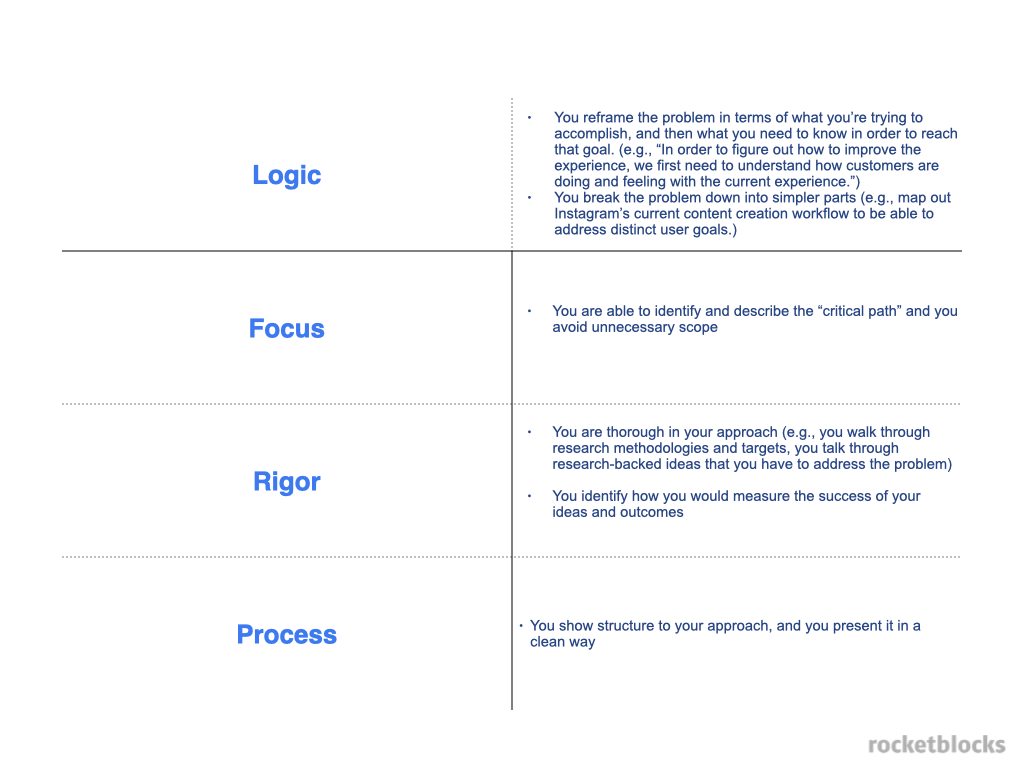
By bringing these qualities to life through your case response, the more likely the interviewers will believe that you have what it takes to do the role exceptionally well.
Problem solving in behavioral interviews
Case interviews do not illuminate the problem-solving scenarios that show up more organically, in between discrete assignments and “business as usual”. Creative problem-solving is how you proactively bring an energy to the table that catalyzes positive change around you.
As you’ve probably figured out by now, these behavioral modules (i.e., Leadership, Collaboration, and Problem-solving) are not mutually exclusive. For example, being a great creative problem solver is oftentimes an attribute of a great leader. The “in-between” problem-solving is really what separates candidates from the pack. These moments can exist in so many different ways – both inside of a job in your professional life and outside of a job in your personal life. Both are fair game in answering behavioral interview questions, unless the interviewer is specifying on-the-job moments. Even in that instance, if your strongest example of exceptional instinct and impact was how you managed a family situation, you could run with that in an interview and be crafty in how you tie that back to how you approach things in your work.
Most likely, you have some great examples in the arsenal, even if you aren’t fully aware of it yet. Check out some examples of behavioral questions below and the response notes in the table to get the juices flowing.
Examples of problem solving behavioral questions:
Example question #1: tell me about a time you convinced leadership to take action on a specific problem that you identified in the organization., example question #2: tell me about a time you had to lead a project you knew very little about., example question #3: tell me about a time when you found a particularly innovative solution to a problem that your team or company was facing., example question #4: give an example of a project you worked on where the scope changed significantly. how did you handle it.
Let’s look at how responses to these types of questions bring out the attributes of a creative problem-solver:
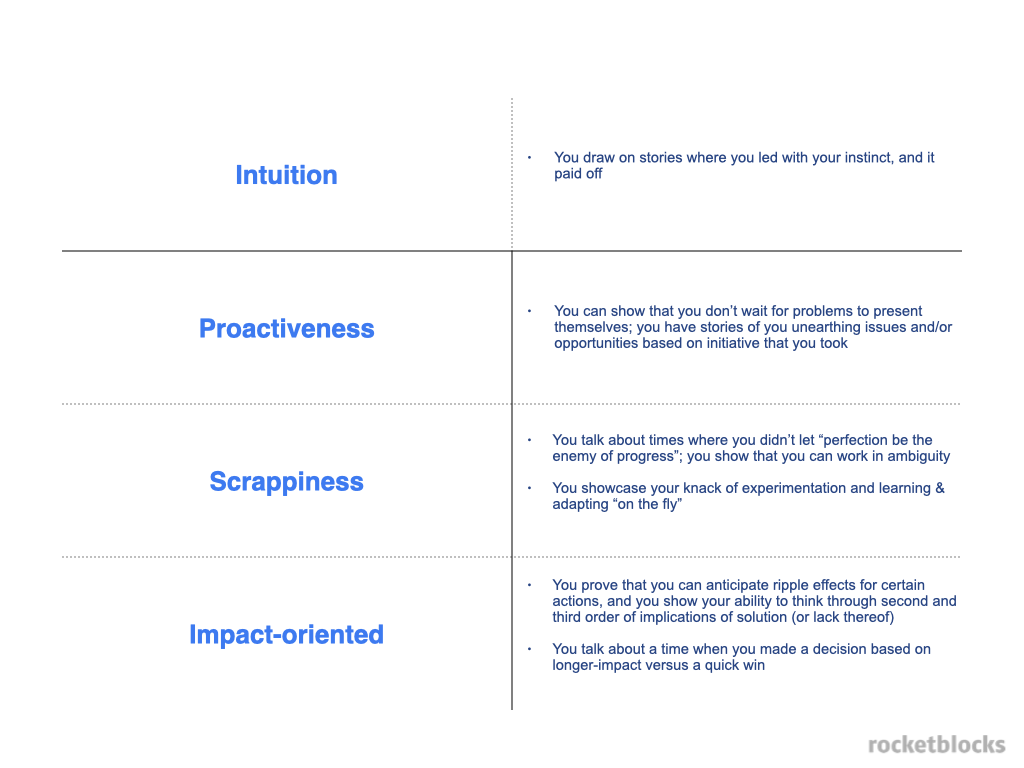
All of the attributes I highlighted within both intellectual and creative problem solving are a general guide. Thinking in this direction should help you bring out the best in your problem solving skills, and you may discover that you have unique attributes that have led to success in the past that aren’t mentioned here: make them shine! While intellectual problem solving is likely more tightly defined by the role and responsibilities, there are many ways you can exemplify creative problem solving, which is what makes these behavioral questions fun!

- Skip to primary navigation
- Skip to main content
- Skip to primary sidebar
- Skip to footer
Career Sherpa
Guide for Lifetime Career Navigation
- Search this site...
51 Behavioral Interview Questions & Answers To Master
June 29, 2021 by Hannah Morgan
Interviews are less stressful if you have some idea of what questions you’ll be asked. Since behavioral interview questions have become quite popular over the years, you can expect some to be thrown your way.

Read this guide to learn more about behavioral interview questions, get a list of the most common questions employers ask, and see some sample behavioral interview questions and answers to help you visualize the process. Plus get actionable tips on how to prepare and respond when you’re asked to give examples of how you handle situations at work.
Table of contents
What are behavioral interview questions, common behavioral interview questions, sample questions and answers, how to prepare.
- Additional Reminders And Tips
When a recruiter or hiring manager asks questions during a job interview, it’s likely they will ask you to tell them about a time when you…
These types of questions are referred to as behavioral interview questions because they help the interviewer understand and evaluate your behavior, as well as your skills.
Imagine trying to evaluate someone’s skills without actually seeing the work being performed. That’s the challenge recruiters face when selecting candidates for a job. The next best thing is to ask you to describe how you’ve solved a problem.
Behavioral questions are designed to help interviewers learn how you would respond to a specific situation and how you solve problems to achieve successful results.
Behavioral interview questions require the candidate to explain how you resolved an issue, solved a problem or fixed something. Embedded within each answer are the human drivers or qualities that show why you took the actions you did. It’s like a small peek into what motivates you.
Here’s what you know:
You and your co-workers approached tasks differently. Imagine you were both interviewing for the same job. Your titles and work would look the same, but how you performed the job would come across differently during the job interview. Those are the subtle differences interviewers hope to discover from asking behavior interview questions. And your unique style of getting work done is exactly what you want to emphasize during the interview. Clearly and concisely.
Behavioral interview answers are the proof or evidence of your soft skills as well as your ability to do the job.
Start today by recalling situations that show future employers you have what they are looking for, especially specific examples that highlight: productivity, leadership, teamwork, initiative, planning, flexibility/adaptability and interpersonal skills.
When practicing how to answer behavioral interview questions, you don’t need to prepare thousands of possible responses. Instead, think about the skills and behaviors your future employer needs. Some of the skills and behaviors are fairly common and would apply to almost any position with any company. Just look at the job description to see which skills are being requested.
Here are common categories you can prepare for during your upcoming interview:
- Career/Experience
Motivation/Self Awareness
Conflict/stress, adaptability/flexibility, problem solving/decision making, planning/organizing, leadership/teamwork.
- Presentation/Communication
Follow Through
There are certain types of questions you can anticipate and prepare for. This list of 50 common behavioral interview questions is broken down by what skills or qualities the interviewer is evaluating.
The types of questions you are asked will vary by your role and level of seniority. In other words, if the job doesn’t require you to deliver presentations, you probably won’t be asked to talk about a time you had to deliver a presentation to a group.
During a one-hour interview, you can probably expect to be asked approximately 10-20 questions, many will be behavioral interview questions.
Career/Work History
- Can you describe for me one of your most important accomplishments?
- Describe for me one of the biggest disappointments in your work history.
- What special aspects of your education or training have prepared you for this job?
- What specific things in your past experience that affected your present career objectives?
- How do you go about making an important decision affecting your career?
- Give an example of how you used what you learned from the last professional development course you took.
- Tell me about a difficult obstacle you have had to overcome.
- Give me an example of a time you took initiative or took the role as a self-starter.
- Provide an example of what gave you the greatest satisfaction at work?
- Give an example of a time something frustrated you at work and how you handled it.
- Describe your most significant failure in the last 2 years.
- Give me an example of an experience on the job that you felt was satisfying.
- Tell me about a time when you missed an obvious solution to a problem.
- Tell me about a time you have been told, or discovered yourself, a problem in your job performance, and what have you done?
- Tell me about how you worked effectively under pressure.
- Give me an example of the most difficult conflict situation in which you were involved?
- Tell me about a time you disagreed with a supervisor.
- Tell me about a time you had to stand up for your beliefs.
- Tell me about a time you disagreed with your manager’s leadership style or team culture.
- Tell me about a time when you were in conflict with a peer and how the situation was resolved.
- Tell me about a time you wish you’d handled a situation with a coworker differently.
- Tell me about a time you encountered pressure on the job and how you handled it.
- Give me an example of the problems you encountered in doing your last job? Which ones frustrate you the most?
- Tell me about a time you had to learn something quickly.
- Tell me about a time when you had to go above and beyond your regular job responsibilities in order to get a job done.
- Tell me about the adjustments you had to make to your schedule working virtually.
- Give me an example of how you communicate with your manager and co-workers in a remote setting.
- Give me an example of the most difficult decision you made in the past year.
- The last time you did not know what decision to make, what did you do?
- Tell me about a time when you had to analyze information and make a recommendation.
- Give me a specific example of a time when you used good judgment and logic in solving a problem.
- Give an example of when you took full responsibility for solving a problem only to find out that you really should have included others in the process.
- Tell me about a time when you were faced with conflicting priorities.
- Give an example of something you’ve recently scheduled.
- Tell me about how you met your objectives this year.
- Tell me about a time when you motivated others.
- Can you give me an example of your ability to manage or supervise others?
- Tell me about a time when you had to get your team together to establish a common approach to a problem.
- Tell me about a time when needed to get your team to accept your ideas or department goals.
- How would you describe your basic leadership style ? Give specific examples of how you practice this.
- Tell me about a tie when you led a group who doesn’t report to you, but from whom you have to get work.
- In your work experience, what have you done that you consider truly creative?
- Can you think of a problem you have encountered when the old solutions didn’t work and when you came up with new solutions?
- What kind of problems have people recently called on you to solve? Tell me what you devised?
Presentation/Communication
- Tell me about a time you had to give a presentation? How did you prepare?
- Give me an example of a time when you had to explain a complex idea or topic to people with less subject knowledge.
- Tell me about the most recent writing project you’ve worked on.
- Tell me about a time you had to build rapport with a coworker or client whose personality was different than yours?
- Give me an example of a time when you had to make sure that due dates were met for work that you delegated?
- Tell me about a time when you gathered feedback from a customer after you completed a project/task or made a delivery?
- Tell me about one of the methods you’ve used to follow up on your projects, tasks, assignments.
To help you formulate your own responses, here are some sample behavioral interview questions and answers. You will notice that these sample answers follow a similar format. One of the best ways to structure your answers to behavioral interview questions is using the STAR format.
Use STAR to organize the information you include in your answer. This ensures you include just the important information the interviewer needs to hear. It also requires you to remember and discuss a specific situation, task, action, and result in your answer.
Here’s more detail on what to include in each element:
- Situation: Describe the situation. Use who, what, where, when, why and how to help you structure the information. Describe a specific event or situation, not a generalized description of what you have done in the past. This situation can be from a previous job, a volunteer experience, or any relevant event.
- Task: What goal were you working toward? What were you being asked to do?
- Action: Describe the actions you took to address the situation with an appropriate amount of detail and keep the focus on YOU. What specific steps did you take and what was your particular contribution? Use the word “I,” not “we” when describing actions.
- Result: Describe the outcome of your actions and don’t be shy about taking credit for the outcome. Be sure to mention measurable or quantifiable results. Was there an increase in performance, efficiency, profitability or impact?
Keep your answer concise and on track by including all elements in your answer using the STAR format. Be as specific as possible without rambling or including too much information.
Never use a generic answer like “I always appreciate different viewpoints from my own. When someone expresses a different opinion, I listen carefully to what the person says and utilize that feedback.” While this answer is technically good, it lacks the details and specifics. An interviewer would find it hard to evaluate your skills or believe you had experience handling the situation.
1. Can you describe for me one of your most important accomplishments?
This behavioral interview question is your opportunity to share one of the top achievements in your career . When selecting your accomplishment, be sure it is relevant to the job you are interviewing for.
Answer: When I was leading the engineering team at XYZ company, we needed to redesign a component to increase output on a printer. I gathered a team made up of sales reps, manufacturing, marketing and engineering to identify what a successful outcome would look like.
After months of meetings spent evaluating costs and timelines, we developed a component that increased the printer’s quality and quantity of printed materials. This new component was used in every new machine produced and increased sales by 25% globally.

2. Tell me about a difficult obstacle you have had to overcome.
The interviewer wants to know how you handle pressure, challenges, adversity and tenacity. Focus you answer on the steps you took to overcome the obstacle.
Answer: While working on a time-sensitive client project, I found the printer was jammed. I first reloaded the paper bins and followed the printer’s error instructions and within minutes the printer was back online.
Not only was my report in the queue but so were several other jobs. The final client report was proofed and delivered ahead of schedule. I also delivered the other print jobs to their owners to keep their workflow on track.
3. Tell me about a time you disagreed with a supervisor or co-worker.
This behavioral interview question evaluates how you view your relationships at work and how you handle conflict. It also shows how you communicate during uncomfortable and uncertain situations. Keep your opinions and emotions out of your answer and state the facts.
Answer: My previous manager had specific ideas about what she wanted in our social media marketing campaigns. She wanted to use text dense graphics. As the lead designer, I believed that a simple call to action was more convincing.
After much discussion, we compromised, and ran each campaign for one week. We then collected the insights related to customer engagement. It turns out that my campaigns performed better so from that point forward, she allowed me to manage our social media independently.
4. Tell me about how you met your objectives this year?
Your ability to set goals and prioritize actions to meet the objectives for your own personal development shows how you structure time and manage priorities. It also evaluates your thought process and motivation.
Answer: In my role as event planner, I was accountable for coordinating events for current and potential customers. As you can imagine, this was quite challenging last year.
After meeting with my manager, we decided to take a brief pause in offering events. I developed a roadmap for monthly meetings with current customers on Zoom which was distributed through emails twice a month. I also collaborated with sales to create a four-part masterclass on selling for potential customers. Our monthly customer meetings averaged 10-30 customers per call and the masterclass enrollment was 100.
5. Tell me about a time when needed to get your team to accept your ideas or department goals.
No matter what role you hold in a company, you need to be able to “sell” your ideas to the team, your manager or a customer. Persuasion and communication are important skills.
Answer: We were rolling out a new workshop and needed the team to support it and encourage students to attend it. We knew that adding another thing to students’ schedules would be looked at as unnecessary.
My manager and I planned a launch meeting and built an agenda for maximum interactivity. The idea was to have our team actually experience what the workshop would be like. After experiencing the benefits and outcomes of the workshop, our team was enthusiastic about recommending it to students and provided first-hand testimonials.
6. Tell me about a time you had to build rapport with a coworker or client whose personality was different than yours?
This behavioral interview question evaluates your interpersonal skills. The interviewer wants to understand what steps you take to bridge differing opinions or work styles.
Answer: While working on a website redesign project, I had to collaborate with team members from across the country and even in different countries. When we launched the project, the first few minutes of each meeting, I did a mini team building exercise where we’d work on solving a light hearted problem together. Once that was completed, each member would deliver their 2 minute update.
What I found was that the exercises helped establish trust among the team and a shared sense of accountability. This made it easier to deliver tough messages or to ask people to work more quickly.
7. Tell me about a complicated problem you have had to deal with.
The interviewer wants to understand how you go about solving complicated problems. In other words, how you identified or gained more understanding of that problem and what steps you took to resolve it.
Answer: Our customer service team was receiving an increased number of complaints about items arriving late. I reviewed our delivery schedule then met with the staff involved in the customer delivery process. What we discovered was that the delay was with our shipping provider. In speaking with the vendor, we came to the realization that there was nothing we could do to reduce shipping times.
I contacted two other vendors and asked for a quote and delivery estimates. After several weeks of negotiations, I finally recommended we change vendors which would guarantee delivery within 3 days. But this would also cost 3% more. We ultimately increased our pricing but also issued a guaranteed delivery date and all customer delivery complaints have stopped.
8. Tell me about a time when you had to go above and beyond your regular job responsibilities in order to get a job done.
The answer to this behavioral interview question will show your motivation, drive and initiative.
Answer: Outside of my regular responsibilities, I took the initiative to coordinate monthly lunch and learn meetings to increase our marketing team’s knowledge of important digital marketing trends.
I invited each team member to submit a list of topics they were interested in and topics they would be interested in presenting. The monthly meetings are well-attended and have helped our team initiate new ideas, increasing our digital content output by 40%.
9. What was your most difficult decision in the past year?
This question is actually several questions – what do you perceive as difficult, what made it difficult and how did you handle it. It’s evaluating how you handle the decision making process. Answer in a way that doesn’t make you look like the victim in the situation and by no means should you criticize or disparage others.
Answer: The decision to lay employees is always difficult – personally and professionally. We had just lost three major clients and I had no choice but to let go of two employees who managed those accounts.
It was truly a financial decision based on budget reductions, but I still felt horrible for my employees. I delivered the news to these employees as empathetically as I could and made sure they all fully understood the details of their severance packages. In the end, they all walked away knowing that the decision was purely business-related.
10. Tell me about a time when you were faced with conflicting priorities.
Your time management and decision making skills are being evaluated by this question. Make sure you focus on the positive aspects of the situation. Don’t go into the negative details.
Answer: My team and I were facing a deadline and my manager was out of the office. Our client was expecting a project to be delivered by 5:00 PM, and I could tell we weren’t going to make the deadline without making some changes.
I re-organized my own tasks so I could dedicate my entire day to focusing on this project. I took the lead and delegated tasks to the five team members in a way that would utilize everyone’s strengths best. By pitching in and reallocating work, we delivered the work to the client on-time. I also emailed our manager to let her know we had met the deadline.
While you can’t know for sure which behavioral interview questions you’ll be asked during an interview, you can prepare and practice your answers to commonly asked questions.
When you have carefully selected relevant stories you want to share in an interview you’ll enter the interview feeling more confident and prepared. Plus, you’ll provide proof you possess the experience the employer is looking for.
Review the job posting carefully
You’ll want to know which stories to include during each interview. To do this, analyze the posting. Look at each requirement and ask yourself “have I ever done this or something like this?” This review will help you identify the most relevant stories so your answer will include the skills and qualities the employer is looking for.
Use the STAR format
STAR stands for situation, task, actions and result. When formatting your answers to behavioral interview questions, every answer you provide should include all four of these elements. STAR also ensures the interviewer gets the important information they are looking for from your response. The most important sections of your answer are the actions you took and the results.
Identify the top 3-5 most relevant stories
While you may be asked to tell more than 5 stories, you should absolutely identify what you think are the most relevant, relatable stories based on the job posting and what you know about the company.
Don’t memorize your answers
You don’t want your answer to sound robotic so don’t memorize your answer word for word. Instead, try remembering your answer as bullet points so your answer flows more naturally. Be sure to know what key skills or action verbs you’ll use while telling your story.
Practice out loud
Writing out your answers just isn’t the same as saying them out out loud. It’s important to practice your answers to make sure you’ll remember the flow to your answer. You want to practice it enough so it sounds natural.
Record your answers
Take your practice to the next level by recording your answers and then listen to how they sound. Just grab your phone or use your computer to record your answers and evaluate the strength of your answers.
Time yourself
We know that attention spans are short. This is true during interviews too. To help you deliver just the right amount of information, try and keep your answer around one minute. This means if you can’t complete your answer in under five minutes, you’ll need to cut information out. Trust me, it probably isn’t all that important to the interviewer. But if they want to know more details, guess what? They’ll ask a followup question.
Smile, relax and let your personality shine
Part of what makes you unique is your personality. Don’t be afraid to let it come out in your answers. And a smile is just icing on the cake. Research has shown that people who smile come across as more likable. And relax. The interview is just a conversation.
Not everyone’s a pro at interviewing
Keep in mind, there are many recruiters and hiring managers who have never been trained how to interview. No matter how experienced or trained they are (or aren’t) you don’t want that to impede the information you need to convey. You can always insert one of your stories to supplement your answer (even if you weren’t asked to cite an example).
Give it your all
During an interview, you have the opportunity to convince the interviewer that your experience and skills are what the employer needs for the role, so take every opportunity to make sure the interviewer knows the full extent of what makes you a good fit for the role.
Keep your answers positive
Always remember to keep your answers positive. Never blame co-workers or your manager or position them as doing something wrong. Additionally, don’t provide information about your mistakes or weaknesses that would cause the interviewer to question your abilities.
Additional Reminders About Behavioral Interviews
- Be sure each story has a beginning, middle, and an end, i.e., be ready to describe the situation, including the task at hand, your action, and the outcome or result.
- Always make sure the outcome or result reflects positively on you (even if the result itself was not favorable).
- Be honest. Don’t embellish or omit any part of the story. The interviewer will find out if your story is built on a weak foundation.
- Be specific. Don’t generalize about several events; give a detailed accounting of one event.
- Vary your examples; don’t take them all from just one area of your life.
Behavioral interview questions shouldn’t catch you by surprise. If you anticipate them and take time to plan your answers to “tell me about a time when” questions, you’ll come across as qualified, capable and compatible. Your answers, in the form of STAR stories are what make you memorable.

Hannah Morgan speaks and writes about job search and career strategies. She founded CareerSherpa.net to educate professionals on how to maneuver through today’s job search process. Hannah was nominated as a LinkedIn Top Voice in Job Search and Careers and is a regular contributor to US News & World Report. She has been quoted by media outlets, including Forbes, USA Today, Money Magazine, Huffington Post, as well as many other publications. She is also author of The Infographic Resume and co-author of Social Networking for Business Success .

- Interviewing
- Career Management
- Social Media
- Summary Sunday
- Products & Services
NEVER MISS A POST!
Don’t miss out on the latest tips and tricks for a successful job search! By subscribing, you’ll get a weekly digest of modern job hunting trends. Whether you’re just starting your career or looking to take it to the next level, my newsletter has everything you need to succeed. Join the community today and stay ahead of the game!
SIGN UP HERE!
- More Networks
- Preparation Tips
- Interview Checklist
- Questions&Answers
- Difficult Questions
- Questions to Ask
Interview Tips
- Dress for Success
- Job Interview Advice
- Behavioral Interview
- Entry Level Interview
- Information Interview
- Panel Interviews
- Group Interviews
- Phone Interviews
- Skype Interviews
- Second Interviews
- Zoom Interviews
- Job Interview Guides
Administrative
- Call Center
- Clerical Interview
Customer Service
- Human Resources
- Office Manager
- Project Manager
- Restaurant Jobs
- Social Work
- Interview Follow Up
- Thank You Letters
- Job References
- Employment Tests
- Background Checks
- Character References
- Accepting a Job Offer
- Decline a Job Offer
- Verbal Job Offer
- Negotiate Salary
- How to Resign
- Job Search Strategy
- Job Search Tips
- Respond to Interview Request
- Letters of Recommendation
- Surviving a Layoff
- Sample Resumes
- Resume Objectives
Cover Letters
Job Descriptions
- Job Interview Blog
- Best Articles
Privacy Policy
- Problem-solving Behavioral Interview Questions
Problem-Solving Behavioral Interview Questions
Problem-solving behavioral interview questions will explore a candidate's ability to analyze a problem by :
- gathering all relevant data
- organizing and understanding the information
- identifying underlying issues
- identifying cause-effect relationships
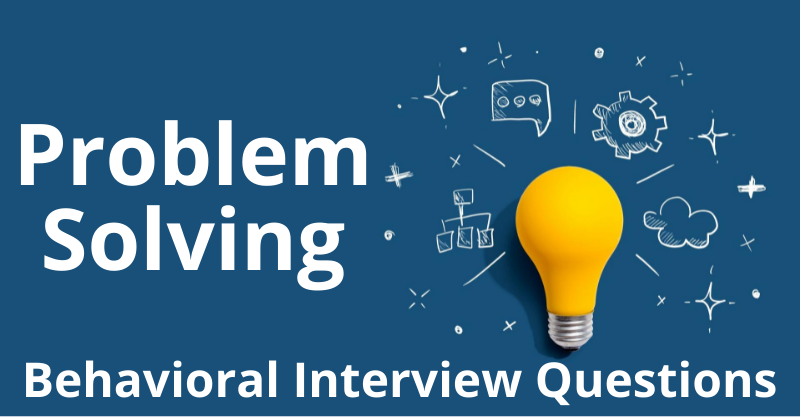
And their ability to then solve a problem by:
- considering alternatives
- weighing the pros and cons of each alternative
- committing to the most appropriate action
- obtaining desired results
Problem-solving behavioral interview questions will focus on specific examples when the candidate demonstrated the ability to effectively analyze and solve a problem.
General problem-solving behavioral interview questions
These sample problem-solving interview questions apply to all positions, regardless of job-type or job-level.
Describe the biggest work-related problem you have faced in the past year. How did you handle it?
Give a specific example of a time when you used good judgment in solving a problem.
Describe a complex problem you had to deal with on your job. How did you identify and gain an understanding of the problem?
Tell me about a time you had to gather information in order to identify the cause of a problem at work.
Can you give me an example of when you were able to identify a small problem before it escalated into a bigger problem?
How did you weigh the pros and cons before making a recent decision?
Describe a time when you faced a problem at work that required quick thinking under pressure.
With little or no work experience:
What types of data and information have you gathered for your job search. How have you used this information to optimize your job search?
Tell me about a time you faced a challenge you’ve never previously experienced. How did you handle it?
Tell me about a time you found your coursework overwhelming. How did you manage it?
Describe a time you lacked the right resources to successfully complete a project. What did you do?
Answering behavioral problem-solving interview questions
Employers are looking for a candidate to describe a logical and considered problem-solving process that includes gathering all the relevant information, analyzing the information and making sound decisions based on the information.
"When I detect a problem at work, I typically start by gathering as much relevant information about the problem as possible. I clearly define the problem and get agreement on this definition. I analyze this information to understand the underlying issues and root cause of the problem. I am then able to identify possible alternatives to address the problem, weigh up the pros and cons of each alternative and decide which approach works best for me and the organization. I determine the actions which need to be taken and commit to the process."
When asked for a specific example to illustrate and support your behavioral interview answer, use the STAR method in order to keep your answer focused and relevant.
The 5 steps to problem analysis
Answers to problem-solving behavioral interview questions that explore a candidate's ability to understand and analyze a problem in order to develop solutions should include these 5 steps:
- detect the problem and recognize a problem exists
- gather all relevant information on the problem including facts, inferences and opinions
- clearly define the problem and gain agreement on the definition from stakeholders
- identify underlying issues or root causes by asking why the problem exists
- recognize cause-effect relationships including direct and indirect causes and effects of the problem
The 5 steps to problem solving and decision-making
The essential steps to successful problem solution and decision-making include:
- define the solution criteria including boundaries and constraints
- determine alternative courses of action that may solve the problem
- weigh the pros and cons of alternatives and evaluate the possible outcomes of each alternative
- commit to the best course of action and develop and execute an action plan
- evaluate the results to determine if the problem is resolved and how to prevent a repeat of the issue
Problem-solving behavioral interview questions for different jobs
These behavioral interview questions help employers evaluate how candidates use their analytical skills to evaluate information in order to determine the most appropriate course of action within a particular job-related context. They explore how candidates will address problems that they are likely to encounter in their specific role.
Management/Supervisor Role
Describe a problem you encountered with your team when trying to achieve a specific objective. How did you go about finding a solution?
Describe a time where you were having difficulty in motivating your team to improve their performance. What did you do to improve the situation?
Give me an example of when you improved a project workflow based on your analysis?
Describe a time you came up with an innovative solution to tackle a complex management problem.
Manager behavioral interview questions
Tell me about a time you didn't meet a sales target. How did you identify and manage the cause?
Describe a situation where you had to collaborate with other sales team members to overcome a difficulty.
Tell me about a challenging sale you closed recently. What was your approach?
Give me an example of a time when you failed to meet a client's expectations. How did you try and rectify the situation?
Sales behavioral interview questions
Give an example of when you had to explain something quite complex to a frustrated client. How did you handle the situation?
Tell me about a time you had to handle a disgruntled or dissatisfied customer? How do you go about resolving the issues?
How have you used the data you have available to adjust your approach to a difficult customer?
Tell me about a time where you identified a potential problem with a customer and were able to prevent it from escalating.
Customer service behavioral interview questions
Tell me about a time you weren't able to meet a deadline. How did you handle it?
Describe a time when you had to solve a fairly complex problem independently. What was the outcome?
Describe a time when you faced a tough challenge in doing your job efficiently. How did you sort it out it?
Tell me about a time you found a project or task to be overwhelming. How did you deal with it?
Administrative interview questions
Tell me about a time you made a mistake in your work. What steps did you take to rectify the situation?
Tell me about an improvement you made to increase the efficiency of a work process.
Describe a tough experience you had putting together a financial report. How did you manage a successful outcome?
Can you give me an example of an unexpected problem that rose during an important project. How did you handle it?
Accounting behavioral interview questions
What else should be evaluated with problem solving behavioral interview questions?
These critical competencies should also be considered when evaluating a candidate's problem-solving ability:
- the ability to recognize patterns and inconsistencies in relevant information gathered
- the ability to break a complex problem down into more manageable parts
- the ability to ask meaningful questions to understand the problem and its root causes
- the ability to anticipate obstacles and constraints to possible solutions
- the ability to determine the implications of each alternative solution
- the ability to find creative and innovative approaches to a problem
- the ability to act decisively by committing to a course of action
- the ability to get buy-in from stakeholders
Essential job interview questions

interview questions
Collaboration Interview Questions

Communication Interview Questions

Time Management Interview Questions
Best behavioral interview questions
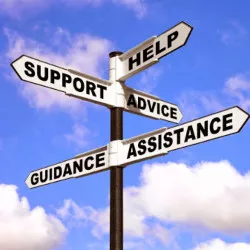
BEHAVIORAL INTERVIEW Q&a
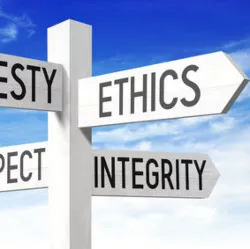
BEHAVIORAL INTERVIEW q&a
Attention to Detail

Planning/Organizing

Negotiation Skills
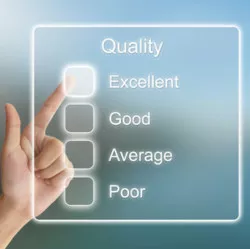
Work Standards
To Top of Page
Don't Miss These Latest Updates
Problem-solving is a key skill for today's workplace. Problem-solving behavioral interview questions
Compelling sample interview answers to "Why do you want to work for this company?"
11 essential supervisor interview questions and answers plus industry specific supervisor Q&A .
How to ask for a letter of recommendation with this sample email requesting letter of recommendation .
What are the top 10 reasons for leaving your job? Find out acceptable reasons for leaving a job.
Sample employment acceptance letter and email to properly confirm your acceptance of the job offer and employment contract.
What are your strengths? Find out the 11 essential workplace strengths at list of strengths and weaknesses
Interview Preparation
Interview Questions & Answers
Interview Guides
After the Interview
The Job Offer
Latest News
© Copyright 2023 | Best-Job-Interview.com | All Rights Reserved.
Professions We Cover
Support & Video Tutorials
Behavioral Interview Questions About Problem Solving

Introduction
Every job requires problem solving. Even if the job’s main focus isn’t creating solutions to obstacles, issues always occur that need to be addressed. Employers want to hire individuals who have developed a portfolio of problem-solving skills they can use to creatively resolve both known and unanticipated challenges as they occur. Key problem-solving skills hiring managers look for when interviewing a candidate include:
- Analytical Skills
- Attention to Detail
- Resolve and Determination
Different jobs involve different types of problems. You can usually identify the types of issues you are likely to encounter in a new job by carefully reviewing the job posting to see what skills the employer requires. These skills will be related to the kinds of challenges they are hiring you to resolve. Knowing this will help you prepare to discuss your problem-solving skills during the interview.
This article will help you get ready for behavioral questions that help employers understand your problem-solving skills and the methods you use to get things done. Knowing how to correctly respond to this type of question will enable you to demonstrate your ability to help the organization achieve its objectives by overcoming issues and convince the interviewer you are the right candidate for the job.
Behavioral Questions
Questions about your problem-solving skills are a specific type of behavioral question. Behavioral questions explore how you handled situations in your past positions and indicate what you will do when faced with similar challenges in the future. You can identify behavioral questions when the interviewer starts the question with something like, “Tell me about a time …” or “What steps did you take …”
Questions About Problem Solving
The best way hiring managers can learn about how organized you are is to ask you questions about your previous experiences. These questions require you to create a story and relate it in a structured and clear fashion. Interviewers will note the skills you used to solve problems and overcome issues, how effective they were, and how you helped the organization achieve its objectives. They hope to hear that you have developed creative problem-solving skills that allow you to quickly resolve any issues and get back to your primary job.

How to Answer Questions Related to Problem Solving
Although many people include problem solving as one of the skills listed on their resume, they may not be prepared to discuss how they go about doing this if asked. Taking some time to review some of the major issues you resolved in your previous jobs and the steps or measures you used to do so will prepare you to talk about this topic. It would help if you focused on recognizing an issue, analyzing it, determining options to resolve it, and then choosing and executing the most effective solution. If you anticipate behavioral questions about problem solving and are prepared to answer them, you will find it easy to respond to these questions during an interview.
Look here for further training on how to answer commonly asked Technical Questions in a way that you will stand out to the interviewer.
Problem solving-related behavioral questions can best be responded to using the STAR format which helps you organize your response by creating a story related to the question.
The STAR format uses the following framework:
Situation – Briefly describe a situation related to the question. Ensure the situation you use describes a time you used your problem-solving skills to overcome a challenging issue.
Task – Summarize the task or goal you needed to achieve. Describe how you quickly identified a challenge and determined what steps were needed to create a solution to resolve it.
Action – Talk about the actions you took which resulted in a successful outcome. These actions should include analyzing the issue, creating innovative solutions, and implementing them.
Results – Discuss the results you achieved and the impact they had on the organization. Emphasize how your problem-solving skills and the creative solutions you developed contributed to the successful outcome and achievement of the goal.
When preparing for an interview, you should anticipate this type of question and have your STAR stories ready. The stories you relate should be relevant to the position for which you are interviewing so they resonate with the hiring manager. Preparing your stories in advance and rehearsing them before the interview will give you confidence. It will also enable you to respond to the interviewer’s questions by providing compelling stories and communicating them clearly and expertly.
Problem Solving-Based Behavioral Questions
Here are some examples of problem solving-based behavioral questions you can anticipate during an interview, the rationale behind them, and an example of how you can respond to them.
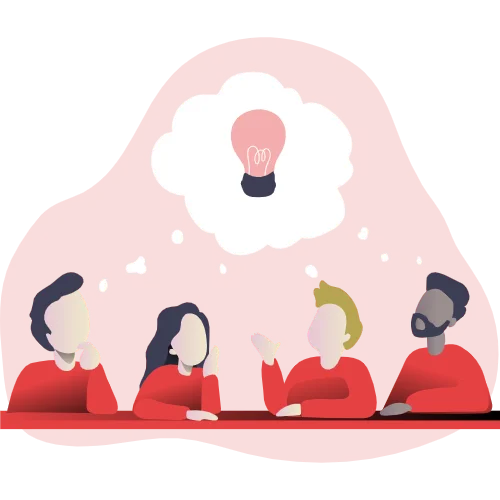
Question : Talk about a time when you came up with a new idea or approach to solve a recurring problem.
Explanation : It is not uncommon to encounter recurring problems on the job. These problems are issues that continue to crop up and are addressed by resolving the impact but not the cause of the issue. Organizations value employees who can resolve an issue by analyzing the root cause and eliminate it so the issue does not recur.
Example : “( Situation ) In my last job, every time we received a shipment, we first had to move inventory stored near the loading dock before we could unload the new materials. ( Task ) This required extra time and delayed the carrier while they waited for us to relocate the older inventory. ( Action ) After witnessing this several times, I determined the cause of the problem was that it took several days to rotate the new materials into production in order to free up the receiving area. I located some additional storage area within the manufacturing facility and created a system which processed and relocated the receivables within 24 hours of them being unloaded. This freed up the loading dock and made it available for subsequent shipments. ( Results ) Solving this issue reduced the amount of time the carriers spent at our facility by 50% which resulted in them offering us a 10% discount on our shipping costs.”
Question : Describe a time when you had to resolve an issue even though you didn’t have all of the information you needed.
Explanation : We are frequently asked to resolve an issue even though we don’t have all of the information we need. Being able to accomplish this requires creativity and innovation. Quickly analyzing the issue, creating a solution, and implementing it with minimal information are key problem-solving skills employers look for in new hires. You should have a STAR story prepared which demonstrates your ability to do this.
Example : “I rarely have all of the information required to analyze and resolve an issue. This has required me to develop skills for solving issues with less than perfect data. I was recently asked to determine why sales of one of our leading products had plateaued. The only information I had was the most recent quarter’s revenues, estimates of our competitor’s sales, and activity reports from the sales team. By analyzing this information, I determined the issue resulted from an overall flattening of demand for this type of product. I put together a plan in our marketing materials which would emphasize alternative uses for the product. Sales increased during the next quarter due to customers using the product for other purposes. We used this same strategy to increase revenues for the entire product line.”
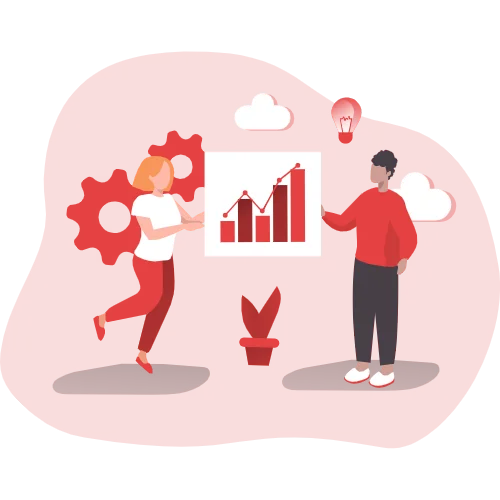
Question : Talk about a time when you used good judgment and reasoning to solve a complex problem.
Explanation : Reasoning and judgment are two important problem-solving skills. Even with complete data, you still have to be able to make good decisions. Being able to illustrate this ability in your answer to such as behavioral question will demonstrate to the hiring manager that you are the right candidate for this role.
Example : “I pride myself on my decision-making skills. When working on a project in my previous job, my team and I were tasked with determining how to reduce the cost of operations without impacting the organization’s productivity. We brainstormed several alternatives, all of which resulted in cost savings but also reduced productivity. It occurred to me that if we used a hybrid of two of the solutions, costs would be reduced, but productivity would not be impacted. We recommended the solution to senior management who implemented it. This resulted in a 50% reduction in manufacturing cost and a slight increase in the organization’s productivity.”
Question : Can you talk about a situation in which you recognized a problem as a potential opportunity?
Explanation : Opportunities are often disguised as problems. Recognizing this and developing creative solutions that leverage the problem in order to take advantage of an opportunity will set you apart from other candidates interviewing for this position.
Example : “While working for a company which produced health foods, I noticed we were spending a great deal of money to dispose of a waste product which consisted primarily of cellulose. It occurred to me that we could probably do something to reduce the cost of disposing the waste. I researched cellulose and discovered it is used to make environmentally friendly disposable containers. I contacted the manufacturer of the containers and negotiated a contract for them to pay us for the cellulose. This more than covered our disposal costs and created a new source of revenue for the company. We also won an award for being a reen-certified producer.”
Question : Tell me about a time when you had to modify a project at the last moment due to unforeseen issues. How did you handle this?
Explanation : Even when you carefully plan and organize a project, unanticipated issues are likely to occur. Your ability to address and resolve them quickly so as not to impact the timeline or the project’s cost is an important skill. Being able to relate a story of how you did this in your previous work will help you succeed during an interview.
Example : “In my first job, one of the projects I was assigned to work on was organizing a team-building activity for our department. I created an event that involved a geomapping activity at a local theme park. The employees would be divided into teams to locate items throughout the park using clues and GPS devices. Several days before the activity was scheduled to be held, the park announced it had to close due to a strike. I quickly went to work, locating another venue and moving the activity to a professional sports facility. Not only did the employees enjoy having access to the stadium, but they were also able to meet some of the team’s players. This resulted in an ongoing relationship between the local NFL team and our company, and we used the facility for future events, including customer promotions and executive meetings.”

Additional Problem-Solving Questions
Have you ever identified a customer’s need and used a creative idea to satisfy it?
Talk about a time you discovered an error overlooked by a co-worker and how you took the initiative to resolve the issue.
Describe a situation in which you found a unique and creative way to overcome a difficult obstacle.
Tell me about the most innovative new idea you’ve come up with.
Describe a time when you anticipated a potential issue and proactively developed measures to prevent it.
Talk about a time when you faced a big obstacle to an important project and what you did to overcome it.
Give me an example of how you analyze information to make a business recommendation.
Please walk me through the steps you take to research a problem and create a plan to solve it, using an example from your previous work.
Can you describe a situation where you collaborated with colleagues to resolve an issue?
Tell me about the biggest work problem you had this year and how you solved it.

The key to nailing your interview – practice, practice, practice.
As with anything, practice makes perfect. The most common ways to practice are with in-person mock interviews or a list of questions. While these options are a great place to start, they can leave a lot to be desired.
Practicing with In-Person Mock Interviews and Question Lists
One way to get valuable interview practice is to set up in-person mock interviews. Unfortunately, they can be somewhat inconvenient. You have to find someone to conduct the mock interview, and schedule a meeting every time you want to practice.
Question lists offer a much more convenient way to practice interviewing. Unfortunately, they do little to recreate actual interview pressure. In a real interview you’ll never know what’s going to be asked and this is exactly what can make interviews so stressful.
Interview Simulators – The best of both worlds.
With interview simulators, you can take realistic mock interviews on your own, from anywhere.
My Interview Practice offers a simulator that generates unique questions each time you practice, so you’ll never see what’s coming. There are questions for over 120 job titles, and each question is curated by actual industry professionals. You can take as many interviews as you need to, in order to build confidence.
Our interview simulator uses video to record your responses, and recreates the pressure you would feel in a real interview. This also allows your to see how you perform and perfect your responses. You can then share your responses with colleagues and mentors so that you can get valuable feedback.
Check out My Interview Practice
Recommended Reading
Behavioral interview questions about leadership skills.
8 Minute Read
Behavioral Interview Questions About Customer Service
Behavioral interview questions about failures.
7 Minute Read
Behavioral Interview Questions About Conflict Resolution
The better way to practice interviewing..
Simulate realistic interviews for over 120 job different titles, with curated questions from real employers.
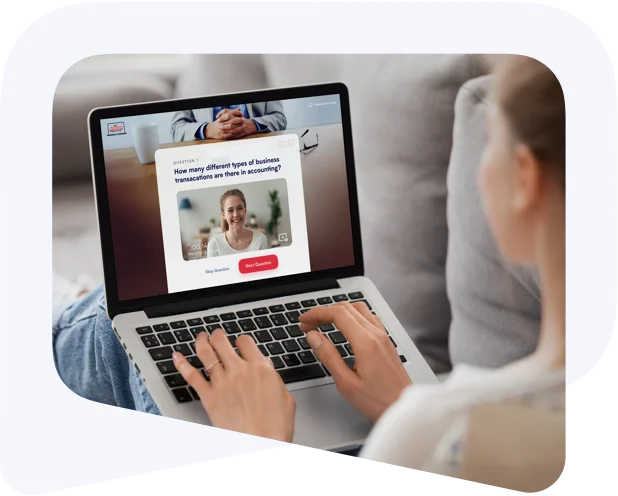
Get the free training guide.
See the most common questions in every category assessed by employers and be ready for anything.
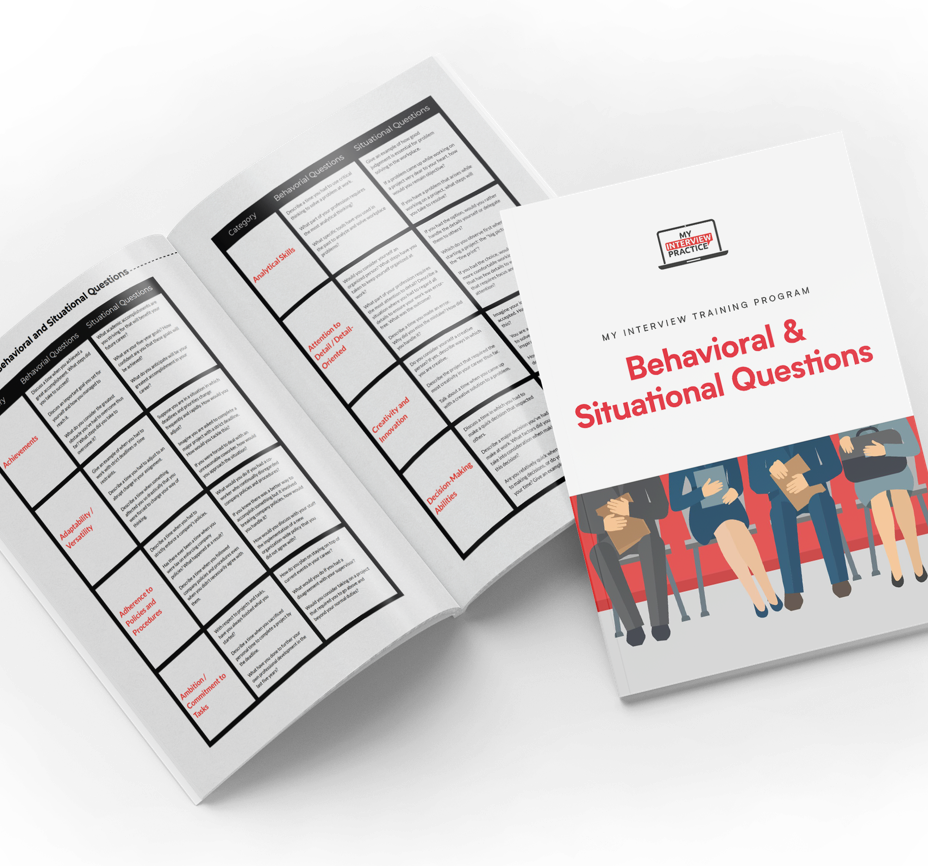
- Following Up After the Interview: Tips and Tricks
- Key Tips For Negotiating A Job Offer
- How to Answer “What Are Your Salary Expectations?” in an Interview
Get 1 month of access for just $19.99
Invest Risk-Free with our 30-Day Money Back Guarantee
Build Confidence and Land Your Dream Job

Get Your Free Training Guide
Enter your email to receive your guide, and be ready for whatever questions come your way.
We hate spam and promise to keep your email safe.

Thank you for requesting the free guide. You should receive the guide in your inbox momentarily.
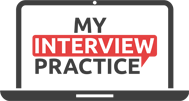
Welcome back!
Forgot your password.
No worries. Enter your email below and we’ll send you instructions on how to reset your password.
Notification
Information.
The Interview Simulator is not enabled for mobile devices and tablets. Please use a laptop or a desktop to access it. If you are using a laptop and still receiving this message, your screen resolution is too low. Please hit the control button and zoom out with your mouse and try again.
Browser Not Compatible
The Interview Simulator is disabled for this browser due to compatibility issues. Please use the latest version of Google Chrome or Mozilla Firefox in order to take an interview.
Explore Jobs
- Jobs Near Me
- Remote Jobs
- Full Time Jobs
- Part Time Jobs
- Entry Level Jobs
- Work From Home Jobs
Find Specific Jobs
- $15 Per Hour Jobs
- $20 Per Hour Jobs
- Hiring Immediately Jobs
- High School Jobs
- H1b Visa Jobs
Explore Careers
- Business And Financial
- Architecture And Engineering
- Computer And Mathematical
Explore Professions
- What They Do
- Certifications
- Demographics
Best Companies
- Health Care
- Fortune 500
Explore Companies
- CEO And Executies
- Resume Builder
- Career Advice
- Explore Majors
- Questions And Answers
- Interview Questions
How To Answer Behavioral Interview Questions (With Examples)
- How To Answer Tell Me About Yourself?
- Elevator Pitch
- Where Do You See Yourself In 5 Years?
- What Are Your Career Goals?
- When Can You Start?
- How Do You Define Success?
- Describe Your Work Ethic
- Where Are Your Current Duties?
- What Are Your Learning Goals?
- Intrinsic Vs Extrinsic Motivation
- What Is Your Desired Salary?
- What Makes You Unique?
- Why Are You The Best Person For This Job?
- Reasons For Termination
- What Are Your Work Values
- How To Make A Hard Decision?
- What Are You Most Proud Of?
- Personal Code Of Ethics
- Problem Solving Interview Questions
- Taking Initiative Example
- How Do You Prioritize Your Work
- Explain Gaps In Employment
- Most Rewarding College Experience
- What Is Your Work Style
- Tell Me About A Time When You Made A Mistake On The Job
- Tell Me About Gaps In Employment
- What Are You Passionate About
- What Skills Would You Bring To The Job
- Who Is Your Mentor?
- How To Answer Tell Me About A Time You Disagreed With Your Boss
- How To Answer Common Screening Questions
- How Do You Handle Stress
- Are You Willing To Travel?
- Do You Work Well With Others?
- Why Do You Want To Work Here?
- What Is Your Greatest Weakness?
- Where Else Are You Interviewing?
- Tell Me About A Time You Failed
- How Do You Like To Be Managed?
- Do You Have Any Questions For Me?
- What Gets You Up In The Morning?
- What Do You Know About Our Company?
- What Is Your Greatest Strength?
- What Is Your Dream Job?
- What Is Your Ideal Work Environment?
- Why Are You Looking For A New Job?
- Why Should We Hire You?
- What Motivates You?
- What Else Should We Know About You?
- When Have You Made A Split Second Decision?
- Tell Me About A Challenge You've Faced At Work
- What Sets You Apart From Other Candidates?
- What Is Your Greatest Accomplishment?
- How Did You Hear About The Position?
- What Do You Do?
- Walk Me Through Your Resume
- Questions About Fast-Paced Work Environments
- What's Your Management Style?
- Why Do You Want This Job?
- How Would Your Friends Describe You?
- What Do You Do For Fun?
- Why Did You Leave Your Last Job?
- Situational Interview Questions
- Promotion Interview Questions
- Internal Interview Questions
- Open Ended Interview Questions
- Tough Interview Questions
- Leadership Interview Questions
- Teamwork Interview Questions
- Interview Questions About Communication
- Personality Interview Questions
- Internship Interview Questions
- Ice Breaker Questions
- Recruiter Interview Questions
- Brain Teaser Interview Questions
- Group Interview Questions
- Competency Based Interview Question
- Grad School Interview Questions
- Scrum Interview Questions
- Excel Interview Questions
- Common Phone Interview Questions And Answers
- Behavioral Interview Questions
- Why Did You Choose Nursing?
- Why Do You Want To Be A Teacher?
- Why Do You Want To Be A Doctor?
- Why Do You Want To Be A Police Officer?
- Police Officer Interview Questions
- Why Do You Want To Be An Accountant?
- Sales Interview Questions
- Interview Questions For Managers
- Retail Interview Questions
- Teacher Interview Questions
- Accounting Interview Questions
- Teaching Philosophy Examples
- Management Philosophy Examples
- Leadership Philosophy
- What Does Customer Service Mean To You
Find a Job You Really Want In
Employers like to ask behavioral interview questions to get an understanding of how you go about solving a problem or handling a situation. This is why it’s essential to understand how to answer behavioral interview questions to help impress your interviewer .
If you have an interview coming up and want to be prepared for anything that may be thrown your way, we’ll go over how to answer behavioral interview questions, provide some common behavioral interview questions and answers, and we’ll go over why interviewers like to ask behavioral based interview questions.
Key Takeaways
One of the best ways to answer behavioral interview questions is to tell a story using the STAR method.
Behavioral interview questions ask for examples of how you dealt with situations at work in the past so that hiring managers can get a better idea of how you might respond to similar situations in the future.
Behavioral interview questions often cover topics such as problem-solving, teamwork, and decision-making, among others.
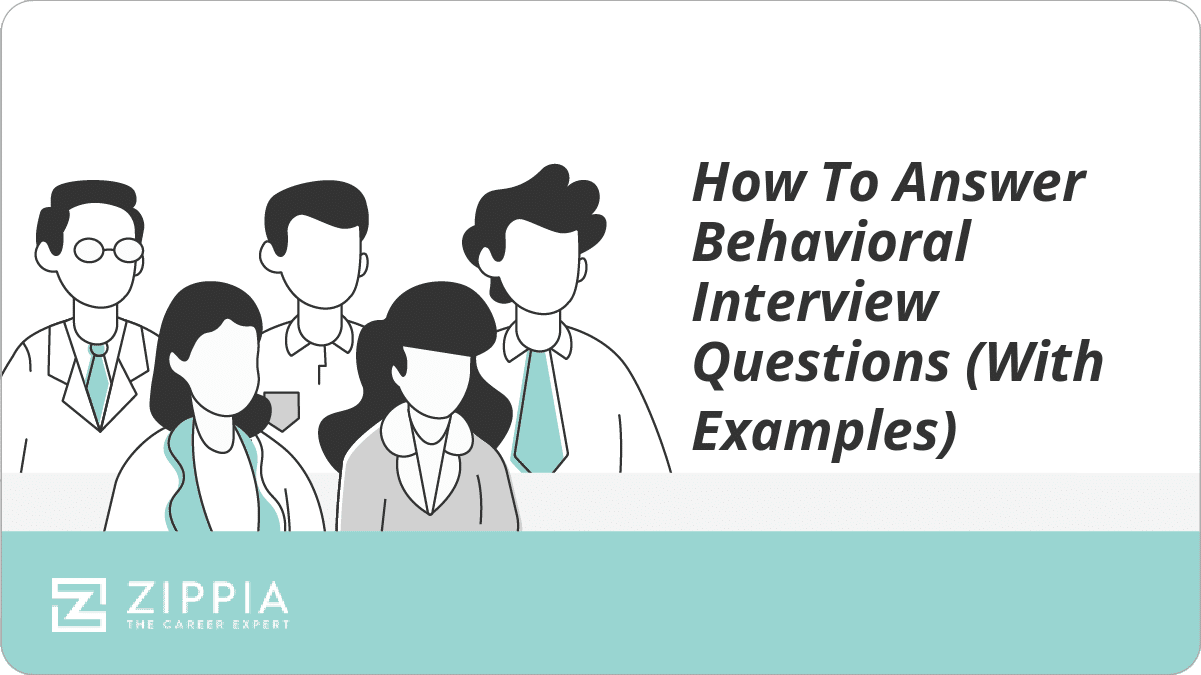
How to answer behavioral job interview questions
Common behavioral interview questions with example answers, what are behavioral interview questions, why do interviewers ask behavioral interview questions, tips for answering behavioral interview questions, behavioral interview questions faq, final thoughts.
- Sign Up For More Advice and Jobs
When answering behavioral interview questions, you should come up with examples of the different skills you want to highlight and tell a story of the example using the STAR method. Here is a more detailed list to answer behavioral job interview questions:
Make a list of examples. When you’re constructing your answer, think about how to portray your actions in such a way that shows off those skills. You should come up with a list of examples of how you utilized the skills that you are highlighting.
Having specific examples from your past will help you tell a story when it comes to using the STAR method.
Highlight your skills. Think about the sort of skills you need to demonstrate in order to be successful at the job you hope to do. These skills are typically more general than they are specific — things like leadership skills, the ability to work with a team, brilliant decision-making, the advanced use of an industry technique etc.
Tell a story. Remember that you’re telling a story and that ultimately, how you tell that story matters most of all. Try to make your story flow as naturally as possible — don’t overload the interviewer with unnecessary details, or alternately, forget too many details for the story to make sense.
They need to understand your answer in order to parse out your behavior. They can’t do that if they can’t understand the story you just told them — in addition to this, they might just find that a person who can’t tell a simple story is just too annoying to work with.
Use the STAR method . If you’re really having trouble telling your story, remember that good old STAR method:
Situation. Start by giving context. Briefly explain the time, place, and relevant characters in your story.
Task. Next, tell the interviewer your role in the story, whether it was a task assigned to you or some initiative you took on your own.
Action. Now comes the juicy stuff; let the hiring manager know what actions you took in response to the situation and your task. Interviewers are interested in how and why you did something just as much as what you did, so spell out your thought process when possible.
This is where you showcase your skills, so try to think of actions that align well with the job you’re applying for.
Result. Finally, explain the end result of your actions. Your focus should always be on what value you contributed to the company, not bragging about your personal accomplishments.
Note that while the result should always be positive, some behavioral interview questions specifically ask about negative situations. In these cases, finish by discussing what you learned from the experience or how the project could have been improved.
Answering behavioral interview questions is your opportunity to show the interviewer how you are as an employee. Here are some of the most common behavioral interview questions with some example answers. Remember to tailor your answers to your specific needs.
Tell me about a time when you had to take a leadership role on a team project.
As a consultant at XYZ Inc., I worked with both the product and marketing teams. When the head of the marketing team suddenly quit, I was asked to step up and manage that department while they looked for her replacement. We were in the midst of a big social media campaign, so I quickly called together the marketing team and was updated on the specifics of the project. By delegating appropriately and taking over high-level communications with affiliates, we were able to get the project out on time and under budget. After that, my boss stopped looking for a replacement and asked if I’d like to head the marketing team full-time.
Can you share an example of a time when you disagreed with a superior?
In my last role at ABC Corp., my manager wanted to cut costs by outsourcing some of our projects to remote contractors. I understood that it saved money, but some of those projects were client-facing, and we hadn’t developed a robust vetting process to make sure that the contractors’ work was consistent and high-quality. I brought my concerns to him, and he understood why I was worried. He explained that cost-cutting was still important, but was willing to compromise by keeping some important projects in-house. Additionally, he accepted my suggestion of using a system of checks to ensure quality and rapidly remove contractors who weren’t performing as well. Ultimately, costs were cut by over 15% and the quality of those projects didn’t suffer as a result.
Tell me about a time when you had to work under pressure.
My job as lead editor for The Daily Scratch was always fast-paced, but when we upgraded our software and printing hardware nearly simultaneously, the pressure got turned up to 11. I was assigned to training staff on the new software in addition to my normal responsibilities. When we were unable to print over a long weekend while the new printing hardware was being set up, I wrote and recorded a full tutorial that answered the most frequently asked questions I’d been receiving over the previous week. With a staff of 20 writers, this really cut down on the need for one-on-one conversations and tutorials. While management was worried we wouldn’t be able to have the writers working at full capacity the following week, the tutorial was so effective that everyone got right on track without skipping a beat.
Can you describe a time when you had to motivate an employee?
When I was the sales manager at Nice Company, we had a big hiring push that added six sales reps to my team in a matter of weeks. One worker in that bunch was working a sales job for the first time ever, and she had an aversion to cold calls. While her email correspondence had fantastic results, her overall numbers were suffering because she was neglecting her call targets. I sat down with her and explained that she should try to incorporate her winning writing skills into her cold calls. I suggested following her normal process for writing an email to cold calls; researching the company and targeting and crafting a message that suits them perfectly. She jumped at the idea and started writing scripts that day. Within a couple of weeks, she was confidently making cold calls and had above-average numbers across the board.
Tell me about a time you made a mistake at work.
When I landed my first internship , I was eager to stand out by going the extra mile. I was a little too ambitious, though — I took on too many assignments and offered help to too many coworkers to possibly juggle everything. When I was late with at least one task every week, my coworkers were understandably upset with me. After that experience, I created a tracking system that took into account how long each task would realistically take. This method really helped me never make promises I couldn’t keep. After that first month, I never handed in an assignment late again.
Can you share a time when you successfully persuaded a team or individual to adopt your ideas or recommendations?
In my previous role at XYZ Company, we were facing a significant challenge with declining customer satisfaction scores. My team was tasked with finding a solution to improve our scores. My task my to identify and implement strategies that would lead to a measurable increase within a three-month-period. To do this, I decided to propose a new customer feedback system to gather real-time feedback and identify areas of improvement. I conducted research to support my proposal, scheduled one-on-one meetings with key team members and stakeholders and tailored my messaging to each individual’s perspective. I also made sure to maintain an open line of communication throughout the process. With my efforts, we were able to successfully implement the new system, which led to a 25% increase in customer satisfaction scores within the first three months.
More common behavioral interview questions
What have you done in the past to prevent a situation from becoming too stressful for you or your colleagues to handle?
Tell me about a situation in which you have had to adjust to changes over which you had no control. How did you handle it?
What steps do you follow to study a problem before making a decision? Why?
When have you had to deal with an irate customer? What did you do? How did the situation end up?
Have you ever had to “sell” an idea to your co-workers? How did you do it?
When have you brought an innovative idea into your team? How was it received?
Tell me about a time when you had to make a decision without all the information you needed. How did you handle it?
Tell me about a professional goal that you set that you did not reach. How did it make you feel?
Give an example of when you had to work with someone who was difficult to get along with. How/why was this person difficult? How did you handle it? How did the relationship progress?
Tell me about a project that you planned. How did your organize and schedule the tasks? Tell me about your action plan.
Give me an example of a situation where you had to adapt to a major change at work or in your personal life. How did you cope with the change?
Tell me about a situation in which you had to work under pressure. How did you maintain your composure and perform effectively?
Give an example of a time when you had to go above and beyond your job description to achieve a goal or deliver exceptional results.
Give me an example of a project you worked on that required you to collaborate with a diverse group of people. How did you ensure effective communication and teamwork?
Give me an example of a time when you had to multitask or manage competing priorities. How did you stay organized and ensure that nothing fell through the cracks?
Behavioral interview questions are questions about how you’ve dealt with work situations in the past and seek to understand your character, motivations, and skills. The idea behind behavioral interview questions is that you’ll reveal how you’ll behave in the future based on your actions in the past.
Unlike traditional interview questions, a hiring manager or recruiter is looking for concrete examples of various situations you’ve been in at work. As such, the best way to prepare for any and all behavioral interview questions is to have an expansive set of stories ready for your interview.
In a behavioral interview, you probably won’t find yourself being asked about your strengths . Instead, you’ll be asked about specific problems you encountered, and you’ll have to give detailed answers about how you dealt with that problem, your thought process for coming up with your solution, and the results of implementing that solution.
Hiring managers and recruiters like to ask behavioral interview questions to determine whether a candidate is a good cultural fit . They also help assess whether the behaviors you’ve exhibited in the past are what the company requires from the role you’re applying for.
That’s why you can expect more behavioral interview questions if your interviewer has a clear idea of what sort of person they want to hire for the job. For example, if they believe that time management and rapid communication are vital for success in the position you’re applying for, they’ll be on the lookout for answers that highlight these traits.
When answering behavioral interview questions, you should prepare and review common behavioral interview questions and prepare stories to help you answer the questions. Here are some more tips to keep in mind when answering:
Prepare for common questions. It’s impossible to prepare for all of the most common interview questions. However behavioral questions are easier to prepare in one sense; they all fall into a handful of basic categories. For example:
Problem-solving
Dealing with clients
Conflict resolution
Decision-making
Goal-setting
Time management
Prepare stories. Now that you have a set of general types of questions, think of an impressive work-related story to go with each. These answers shouldn’t sound memorized, but it’s good to jot down bullet points for each story to make sure you’re stressing the most important elements.
Read the job description carefully. Before you go into the interview, and perhaps before you even start preparing stories beforehand, read the job description closely . Highlight action verbs in one color and adjectives in another. Then, think of ways to naturally incorporate those qualities and behaviors into your answers.
For example, if a job description emphasizes strong time management, you might change the emphasis of one of your stories to how well you planned and executed time frames, rather than the results of that project.
Be positive. Some behavioral interview questions (many, actually) will have you discuss negative situations, like conflicts or mistakes. Take accountability when appropriate (without making yourself look too bad) and never blame a former coworker or superior for a bad result.
The hiring manager might have to work with you, and even recruiters don’t want to add a team member who’s constantly throwing other people under the bus. Instead, focus on the lessons you’ve learned and the improvements you’ve made.
Tell the truth. Yes, you want to put your best foot forward in the interview, but you shouldn’t embellish or lie about your capabilities. Most hiring managers will be able to pick up on whether you’re lying or not, and even if they don’t, it will quickly become apparent once you start the job.
Quantify your stories. When you’re answering behavioral interview questions, include numbers whenever you can. For example, saying you took 85 calls a day rather than “a bunch” makes a bigger impact and gives hiring managers a better idea of what you actually did.
What is the difference between traditional interview questions and behavioral interview questions?
Traditional interviews are focused on the future, while behavioral interviews are focused on the past. In a traditional interview, you’re asked a series of questions where you’re expected to talk about yourself and your personal qualities. interviews in this vein tend to ask questions that are sort of psychological traps — oftentimes the facts of your answer matter less than the way you refer to and frame those facts.
Behavioral interviews are harder to game because instead of asking about how you might deal with a particular situation, they focus on situations you’ve already encountered.
What are interviewers looking for when they ask behavioral interview questions?
Interviewers are looking for you to provide examples and evidence about your skills and on-the-job behavior when they ask behavioral interview questions. This will help them get an understanding of how you will handle things in the future. Your answer should demonstrate the skills needed for the role by providing examples of how you’ve used those skills in the past.
Behavioral interview questions aren’t usually isolated. That is to say, you won’t usually find yourself in “The Behavioral Interview.”
They could be sprinkled into your very first interview , or you might not hear any of them until you’ve almost got your job in the bag.
You might have an entire interview made up of just these sorts of questions. Maybe you’ll hear only one.
Either way, behavioral interview questions are less of an overwhelming strategy than they are a specific tool that a hiring manager has at their disposal.
It’s true that some hiring managers prefer them while others avoid them, but as we said, a lot of that ultimately comes down to personal philosophy. There are a lot of weaknesses to asking only behavioral questions, though, so the best hiring managers out there know to mix them in with the more straightforward, future-focused traditional interview questions.
The University of Virginia – Behavioral-Based Interview Questions
U.S. Bureau of Labor Statistics – Employment Interviewing: Seizing the Opportunity and the Job
How useful was this post?
Click on a star to rate it!
Average rating / 5. Vote count:
No votes so far! Be the first to rate this post.

Ryan Morris was a writer for the Zippia Advice blog who tried to make the job process a little more entertaining for all those involved. He obtained his BA and Masters from Appalachian State University.
Recent Job Searches
- Registered Nurse Jobs Resume Location
- Truck Driver Jobs Resume Location
- Call Center Representative Jobs Resume Location
- Customer Service Representative Jobs Resume
- Delivery Driver Jobs Resume Location
- Warehouse Worker Jobs Resume Location
- Account Executive Jobs Resume Location
- Sales Associate Jobs Resume Location
- Licensed Practical Nurse Jobs Resume Location
- Company Driver Jobs Resume
Related posts

Questions To Ask At The End Of A Job Interview

11 Tips For A Successful Onsite Interview

Ice Road Trucking Jobs: Everything You Need To Know

14 Easy Ways To Get Fired
- Career Advice >
- Get The Job >
- Answering Behavioral Interview Questions
- Entrepreneurship
- Management Information Systems (MIS)
- Supply Chain Management (SCM)
- Building Your Bauer Resume
- Career Exploration and Assessment
- Experiential Resume Builders
- Job Search Strategy
- Behavioral Interviews
- Salary Negotiation
- Job Selection including choosing between Multiple Offers
- Internships for Credit
- Available Jobs
- Resource Library
- Video Library
- Upcoming Events
- Employment Statistics
- BBA Career Services Team
- Full-Time MBA Program
- MBA/MS Career Services Team
- Hire an Intern
- Post a Job or Event
- Recruiter Guide
- On Campus Interviewing (OCR/OCI)
- Résumé Books
- Register for an Event
- Host an Information Table
- Host an Information Session
- Virtual Recruiting
- About Bauer College
- Bauer Student Demographics
- Undergraduate & MS Accountancy Employment Statistics
- Graduate Employment Statistics
- MBA Company Trek
- International Students
- UH Non-Business Majors
- Bauer Student Organizations
- Ethics Case Competitions
- Corporate Projects
- Mock Interviews
- The Rockwell Career Center Advisory Board
- Undergraduate & Graduate Programs
- Meet the Team
- Directions to the Rockwell Career Center
- Campus Information
- Alumni News
- Alumni Overview
- Alumni Document Resources
- Bauer Career Gateway
- Volunteer with Rockwell Career Center
- Faculty Career Toolkit
- Faculty Resources
- RCC Mission
- Career Course
Problem solving behavioral interview questions
- Share This: Share Problem solving behavioral interview questions on Facebook Share Problem solving behavioral interview questions on LinkedIn Share Problem solving behavioral interview questions on X
Problem solving behavioral interview questions was originally published on RocketBlocks .
Case questions | Behavioral questions | Sample questions
Problem solving is a key set of skills tested in behavioral interviews. And most companies will test this in both behavioral *and* case interviews.
Cases interviews evaluate specific problem solving attributes: logic, focus, rigor, process .
Behavioral problem solving questions evaluate another: intuition, proactiveness, scrappyness, impact-oriented .
Intellectual & creative problem solving: Why both?
Problem scenarios that require intellect and technical skill are a critical aspect of the types of jobs you are likely applying for. That’s why case studies are incorporated into the hiring process. It’s a sure-fire way to test technical ability and skill in addition to how well someone may talk about a skill – i.e., “Can this candidate walk the talk in the way that we need them to?”
However, case-study-style problems do not represent the full reality of what it takes to excel in a role and add unique value to the company (which is what top companies want from their hires). There are problem-solving opportunities that occur in between assignments that can really move the needle for a team, a product line, and a business!
This duality in problem solving exists across Consulting, Product Management, Product Marketing, and Strategy & BizOps…among other fields and roles too.
Let’s dive in.
Problem solving through a case question (Top)
Not every role type will have case studies as part of the interview process, but most of the roles that we cater to in the RocketBlocks modules will.
Example case interview question #1: How would you improve the experience at Instagram for Content Creators?
As an open-ended case question, this one does not have a singular correct answer. What the interviewer looks for here is how well you would structure an approach to solving this problem well.
Let’s look at how a good response to this can exemplify each of the following attributes of an intellectual problem-solver:

By bringing these qualities to life through your case response, the more likely the interviewers will believe that you have what it takes to do the role exceptionally well.
Problem solving in behavioral interviews (Top)
Case interviews do not illuminate the problem-solving scenarios that show up more organically, in between discrete assignments and “business as usual”. Creative problem-solving is how you proactively bring an energy to the table that catalyzes positive change around you.
As you’ve probably figured out by now, these behavioral modules (i.e., Leadership, Collaboration, and Problem-solving) are not mutually exclusive. For example, being a great creative problem solver is oftentimes an attribute of a great leader. The “in-between” problem-solving is really what separates candidates from the pack. These moments can exist in so many different ways – both inside of a job in your professional life and outside of a job in your personal life. Both are fair game in answering behavioral interview questions, unless the interviewer is specifying on-the-job moments. Even in that instance, if your strongest example of exceptional instinct and impact was how you managed a family situation, you could run with that in an interview and be crafty in how you tie that back to how you approach things in your work.
Most likely, you have some great examples in the arsenal, even if you aren’t fully aware of it yet. Check out some examples of behavioral questions below and the response notes in the table to get the juices flowing.
Examples of problem solving behavioral questions: (Top)
Example question #1: tell me about a time you convinced leadership to take action on a specific problem that you identified in the organization., example question #2: tell me about a time you had to lead a project you knew very little about., example question #3: tell me about a time when you found a particularly innovative solution to a problem that your team or company was facing., example question #4: give an example of a project you worked on where the scope changed significantly. how did you handle it.
Let’s look at how responses to these types of questions bring out the attributes of a creative problem-solver:

All of the attributes I highlighted within both intellectual and creative problem solving are a general guide. Thinking in this direction should help you bring out the best in your problem solving skills, and you may discover that you have unique attributes that have led to success in the past that aren’t mentioned here: make them shine! While intellectual problem solving is likely more tightly defined by the role and responsibilities, there are many ways you can exemplify creative problem solving, which is what makes these behavioral questions fun!
Back Next: Culture fit interviews
Student Resources
Uesful links.
Michael J. Cemo Hall 2nd Floor 4246 Martin Luther King Boulevard Houston, TX 77204-6021
©2024 University of Houston. All rights reserved.
- Report a problem with this page
- Texas Homeland Security
- Fraud Reporting
- Fraud & Non-Compliance Hotline
- Linking Notice
- Privacy Notice
- Open Records/Public Information Act
- Institutional Résumé
- Required Reports
- Electronic & Information Resources Accessibility
- Discrimination and Sexual Misconduct Reporting and Awareness
- University Policies

Nurse Interview Questions: What to Expect and How to Prepare For Your Next Job Opportunity
E ntering the healthcare field and launching your nursing career can be exhilarating. One critical stage in this process is the nursing job interview.
The nurse interview is your opportunity to showcase your skills, express your passion for patient care and convince hiring managers that you would make a valuable addition to their healthcare team.
Related: These 5 Careers Could Be the Future of Healthcare | Entrepreneur
The nurse interview questions may range from general inquiries about your background and experience to specific questions assessing your competencies in various scenarios.
These interviews can be challenging because, in addition to evaluating your technical knowledge, hiring managers are also interested in your interpersonal skills, critical thinking abilities, adaptability and capacity to handle stressful situations.
However, it's important to remember that this isn't a one-way street. Interviews are also a chance to evaluate whether the organization and the role align with your career goals and values.
The key to succeeding in a nursing job interview lies in preparation. It's not enough to have an impressive resume — you also need to articulate your skills and experiences effectively during the interview.
By preparing in advance, you can confidently walk into the interview room, ready to provide thoughtful and articulate answers to any questions.
How do you truly understand the job description for nursing positions?
To prepare effectively for a nursing job interview, one of the first steps is to understand the job description thoroughly.
A job description is more than a list of tasks; it serves as a blueprint of what the organization looks for in an ideal candidate.
Related: How to Develop the Perfect Job Description | Entrepreneur
The components of a nursing job description can be broadly classified into four categories:
- Job summary: This section provides a broad overview of the role, its main objectives and where it fits in the healthcare team.
- Responsibilities and duties: Here, you'll find a list of typical tasks you'd be expected to perform in the role. It might include responsibilities related to patient care, administering medication, maintaining patient records and collaborating with other healthcare professionals.
- Qualifications and skills: This part outlines the professional and academic qualifications needed for the role, such as a bachelor's degree in nursing or a valid registered nurse license. It also lists desired skills like problem-solving, communication and teamwork.
- Physical and emotional demands: Nursing can be physically and emotionally demanding. This section details the physical abilities required (like lifting patients) and the emotional resilience needed to cope with stressful situations.
By understanding the job description, you can anticipate some of the nurse interview questions that might come up.
For instance, if the job description emphasizes teamwork, be prepared to answer questions about your experience working in a team, how you handle conflicts and how you have collaborated with coworkers in the past to improve patient care.
Studying the job description is not just a part of the job search process — it's also a vital part of interview preparation.
Knowing the job description inside and out can help you tailor your responses during the interview, allowing you to demonstrate why you're the best candidate for the position.
What are some common questions to expect during a nursing interview?
When it comes to nursing job interviews, several questions tend to come up, whether you're a fresh-faced graduate from nursing school or a seasoned nurse practitioner looking for new opportunities.
By understanding and preparing for these most common nursing interview questions, you'll be well-positioned to make a strong impression on recruiters and hiring managers.
Related: 50 Most Common Interview Questions | Entrepreneur
"Tell me about yourself."
While not technically a question, you're almost certain to face the ubiquitous "tell me about yourself" request. It may seem simple, but this is not the time for a rambling account of your life story.
Instead, view this question as a golden opportunity to offer a strategic overview of your professional trajectory, carefully focusing on experiences that underscore your commitment to excellence in nursing and patient care.
For instance, you could begin by speaking about where you received your education, perhaps noting any specific areas of study that ignited your passion for nursing. You might then touch on your clinical experiences during nursing school , discussing where you completed your rotations and detailing some of the key learnings or moments that stand out in your memory.
If you've already begun your nursing career, make it a point to highlight the roles you've held and accomplishments you're proud of. Don't be shy about sharing any recognition or awards you've received — these can be powerful testaments to your skills and dedication.
"Tell me about yourself" is an open-ended question that invites you to frame your narrative in a way that positions you as a strong candidate for the role. Tailoring your answers to fit what you know about the job can be as impactful as having a well-crafted cover letter.
"Why should we hire you?"
The question, "Why should we hire you?" is another staple of the nursing interview. When confronted with this question, it's vital to deliver a clear, concise and persuasive argument that aligns your unique skill set and experiences with the needs outlined in the job description.
Take the time to dissect the job description and identify its essential requirements. Then, consider how your skills, experiences and attributes meet these requirements. Be specific with your examples.
For instance, if the job description emphasizes the importance of teamwork and adaptability, be prepared with an example answer demonstrating how you've previously excelled in these areas, perhaps by describing a situation where you successfully navigated a conflict within your team or adapted to a sudden change in a patient's condition.
What are some common behavioral questions in nursing interviews?
In addition to general questions, you can expect to encounter behavioral interview questions during your nursing job interview. These questions are designed to gauge your critical thinking skills, adaptability and how you handle difficult situations, all crucial components of nursing work.
One widely-accepted approach to answering these questions is the STAR method: Situation, Task, Action and Result.
This method helps you structure your answer by providing a specific example (Situation and Task), explaining what you did (Action) and then sharing the outcome (Result).
Related: 6 Tips on How Job Seekers Can Prepare for All Types of Interview Questions | Entrepreneur
For instance, you may be asked, "Can you describe a time when you had to handle a difficult patient?"
Using the STAR method, you might respond with the following:
- Situation: "In my previous role as a registered nurse at XYZ hospital, I was assigned a patient who was non-adherent with their treatment plan."
- Task: "As their primary nurse, it was my responsibility to ensure they understood and followed their treatment plan."
- Action: "I took some extra time to sit with them, educate on the importance of the treatment in language they could understand and address their fears and concerns."
- Result: "After their educational session, the patient participated in afternoon rounds with the care team and became adherent with their treatment, and their condition improved significantly."
Preparing for these questions is essential by reflecting on your past experiences in patient care, teamwork and critical thinking. Remember, it's not just about what happened but how you handled it, what you learned and how it influenced your approach to nursing.
What questions about teamwork and interpersonal communication might you hear at a nursing interview?
Working effectively as part of a healthcare team is a crucial attribute of nursing .
Consequently, you should expect questions regarding your teamwork skills and experience collaborating with coworkers during your nursing job interview. The idea is to find out if you're a "team player" or not.
For instance, you might be asked, "Can you describe a time when you had to work with a difficult coworker?"
An example response, using the STAR method, might be as follows:
- Situation: "At my previous nursing job, I had a coworker who often failed to complete their charting on time, which created delays and confusion for the rest of the nursing staff."
- Task: "As this affected patient care and the overall productivity of the team, it was important to address the issue without escalating tensions."
- Action: "I chose to have a private conversation with the coworker, explaining how their delayed charting was impacting both the team members and patient care. I also offered to help them with charting tips if they were feeling overwhelmed."
- Result: "The coworker was receptive to my feedback and improved their charting habits, leading to a smoother workflow for our team."
Remember that when answering these questions, the focus should be on your ability to maintain a professional and positive attitude, resolve conflicts and contribute to a collaborative and supportive work environment.
What role-specific nursing interview questions might you be asked?
During your nursing job interview, you can also anticipate questions that pertain specifically to the role you're applying for.
Whether you're interviewing for a position as a registered nurse, nurse practitioner, ICU nurse or pediatric nurse, it's essential to tailor your responses to highlight your relevant skills and experiences.
For example, if you're interviewing for an ICU nurse position, you might be asked, "How do you handle high-stress situations?"
You could respond by explaining your stress-management techniques and providing an example of a high-pressure scenario you successfully navigated in a past ICU role.
If you're interviewing for a pediatric nurse role, you might be asked about your experiences working with children and families. You could discuss any family-centered care approaches and how you communicate effectively with young patients and their family members.
In preparing for these role-specific questions, revisiting your nursing school or NCLEX knowledge is essential, particularly regarding the role in question. Also, carefully review the job description to understand the primary responsibilities and requirements of the position.
Remember, the goal is to demonstrate that you have the requisite technical skills and the situational aptitude to excel in the specific nursing role you're pursuing.
The more you can align your responses with the unique needs of the role, the more convincing your suitability for the job will be to the hiring managers.
What are scenario-based nursing questions?
Scenario-based interview questions, situational or "what would you do" questions, are often used in nursing interviews to evaluate your problem-solving skills, critical thinking abilities and understanding of patient care.
These questions often involve hypothetical situations related to stressful situations, charting errors or issues with patient safety.
One such question could be, "What would you do if you noticed a mistake in a patient's charting ?"
In this case, an effective response might be: "First, I would double-check to ensure that I'm not mistaken. If confirmed, I would immediately inform my nurse manager or the appropriate authority about the discrepancy. I understand that accurate charting is crucial to patient safety and it's essential to correct any errors as soon as possible."
When addressing these questions, it's critical to stay calm, methodically walk through your thought process and emphasize your commitment to patient care and safety. If possible, relate your response to a real-life experience where you applied similar decision-making skills.
What are some tips for recent nursing graduates?
Entering the nursing field as a new grad can be daunting, particularly when facing your first nursing job interview.
Here are a few tips for new grads starting their nursing career path.
- Prepare for different interview formats: You might be asked to do a phone interview before an in-person interview. For phone interviews, ensure you have a quiet, uninterrupted space. For in-person interviews, dress professionally and arrive early to show punctuality and respect for the interviewer's time.
- Research the institution: Familiarize yourself with the institution's mission, values and patient population. This will show your initiative and allow you to tailor your responses to align with the institution's values.
- Prepare for questions about your career goals: You might be asked where you see yourself in the future. Be honest about your career goals and emphasize your willingness to learn, adapt and contribute to your new workplace.
For example, if asked, "Where do you see yourself in five years?" you could say: "In five years, I see myself having grown significantly in my nursing skills and knowledge, perhaps even specializing in a particular area of care. However, my primary focus right now is to learn as much as I can, provide the best patient care and positively impact my team and the patients I serve."
Remember, preparation is critical to a successful interview. By anticipating the types of questions that might be asked and considering your responses in advance, you'll be better equipped to answer with confidence and poise.
Your nursing school education and NCLEX study prep have prepared you for this moment — now it's time to take that final step toward your nursing career.
What should you ask your interviewer?
An important, often overlooked aspect of any job interview, including a nursing job interview, is asking questions to the hiring managers.
Asking well-thought-out questions demonstrates your genuine interest in the role and the healthcare team you may be joining. It also helps determine if the job and the organization align with your career goals and values.
Related: Essential Questions to Ask at the End of an Interview | Entrepreneur
Here are some insightful questions you might consider:
- "What are the opportunities for professional development and continuing education here?" This question showcases your eagerness for growth and learning within your nursing career.
- "How does the hospital handle stressful situations like an influx of patients or a shortage of nursing staff?" By asking this, you show you're forward-thinking and considering how you'll handle challenging circumstances.
- "How would you describe the hospital's culture and the dynamics of the healthcare team I'd be working with?" This gives you insight into the work environment and team dynamics.
Remember, the job interview is as much a chance for you to learn about your potential employer as it is for them to know about you. Take this opportunity to ensure the role and organization fit your career aspirations well.
The next steps in your nursing career
Preparing for nurse interview questions can seem daunting, but you can confidently navigate your nursing job interview with careful preparation.
From understanding the job description and common nursing interview questions to handling behavioral and scenario-based questions, you're now equipped with the knowledge to ace the interview.
Related: How to Nail a Job Interview (Whether You're Applying or Hiring) | Entrepreneur
Remember that each interview is an opportunity for new grads to learn and grow. Regardless of the outcome, take the time to reflect on the experience, consider the feedback received and improve your interview skills.
The journey in your nursing career is rewarding and filled with opportunities to make a difference in patients' lives every day. Whether you're a registered nurse, a nurse practitioner, an LPN or LVN or aiming for a specialized nursing role, the interview process is a crucial step on this path.
Best of luck with your nursing job interview and here's to the many successes that lie ahead in your nursing career.
If you're interested in learning more about healthcare opportunities in the world of business, then check out some of the other articles at Entrepreneur for more information.


IMAGES
VIDEO
COMMENTS
Problem-solving interview questions are questions that employers ask related to the candidate's ability to gather data, analyze a problem, weigh the pros and cons and reach a logical decision. ... Video: Top Tips for Using the STAR Method Taylor explains how to stand out when answering behavioral interview questions using the STAR Method, a ...
To put these skills to the test, recruiters use "problem-solving" job interview questions, also known as analytical questions. Here are some common ones: Tell me about a situation where you had to solve a difficult problem. Give me a specific example of a time when you used good judgment and logic in solving a problem.
9. Tell us about a time when you identified a potential problem and resolved the situation before it became a serious issue. Sample answer to show you can identify problems and solve them. 10. Give a specific example of a time when you used good judgment and logic in solving a problem. Sample to show how you use logic to solve work problems.
MIKE'S TIP: When you're answering this question, quantify the details. This gives your answer critical context and scale, showcasing the degree of challenge and strength of the accomplishment. That way, your answer is powerful, compelling, and, above all, thorough. 2. Describe a time where you made a mistake.
Practice common behavioral questions: Familiarize yourself with frequently asked behavioral interview questions, such as those about teamwork, problem-solving, decision-making, and conflict resolution, and prepare your responses using the STAR method. Practice your answers aloud to become more familiar with your responses, and try doing this in ...
In any case, just make sure to wrap up your story with a nice summation so that the interviewer knows what they were supposed to learn from it. In other words, tell your story and then tell them what to think about it. "I did this to solve the problem, so in general, this is the process I use for solving problems.". 4.
Problem-solving behavioral questions with sample answers Describe a situation where you had to make a tough decision with limited information. Sample answer (Software Developer): A few months ago, while working on an important project with a tight deadline, we encountered a technical issue and we didn't have much time.
Review 10 behavioral interview questions with answer examples and explore some tips to boost your confidence level by helping you prepare for your next interview. Home. ... Behavioral interviews help employers determine your skills and qualities, such as problem-solving, customer service, critical thinking and communication.
The STAR method stands for Situation, Task, Action, Result. It's a formula worth memorizing because it can help you structure your responses to behavioral interview questions. Situation: Start by establishing the situation and sharing any important details. Task: Recount your specific task or responsibility.
Communication: Your ability to convey information clearly and concisely to others. Teamwork: How effectively you collaborate with team members on projects and tasks. Problem-solving: Your approach to identifying and addressing challenges in your work. Adaptability: How you handle change and adapt to new situations.
10. Tell me about a time you had to make an unpopular decision. If you're applying for a management role, this is one of the most common behavioral questions you'll encounter. Many members of the leadership team have to make difficult choices, and sometimes, they won't resonate with team members.
This question assesses problem-solving and efficiency skills. ... Click the link below to download the behavioral interview questions pdf list. Frequently asked questions. What are the top behavioral interview questions? Focus on questions that assess communication, emotional intelligence, and problem-solving skills. ...
Problem-solving interview questions show how candidates: Approach complex issues. Analyze data to understand the root of the problem. Perform under stressful and unexpected situations. React when their beliefs are challenged. Identify candidates who are results-oriented with interview questions that assess problem-solving skills. Look for ...
Problem solving is a key set of skills tested in behavioral interviews. And most companies will test this in both behavioral *and* case interviews. Cases interviews evaluate specific problem solving attributes: logic, focus, rigor, process. Behavioral problem solving questions evaluate another: intuition, proactiveness, scrappiness, impact ...
Examples of behavioral interview questions. Behavioral questions about decision making and problem-solving. Q1: Describe a situation in which you used good judgment and logic to solve a problem ...
During a one-hour interview, you can probably expect to be asked approximately 10-20 questions, many will be behavioral interview questions. ... Give an example of when you took full responsibility for solving a problem only to find out that you really should have included others in the process.
The following examples of behavioral interview questions and answers use the above technique. Each will come with an answer trigger to help you quickly think of a relevant example for your answer. 1. Describe a situation when you had a busy day and more work came to your desk.
The three main categories of interview questions that will help you assess problem-solving skills include: 1. Behavioral Interview Questions. Great problem solving interview questions focus on behavior, revealing how candidates have handled stress or adversity in the past and highlighting their temperament. Understanding the candidate's past ...
Don't Miss These Latest Updates. Problem-solving is a key skill for today's workplace. Problem-solving behavioral interview questions. Compelling sample interview answers to "Why do you want to work for this company?". 11 essential supervisor interview questions and answers plus industry specific supervisor Q&A .. How to ask for a letter of recommendation with this sample email requesting ...
You can identify behavioral questions when the interviewer starts the question with something like, "Tell me about a time …" or "What steps did you take …". Questions About Problem Solving. The best way hiring managers can learn about how organized you are is to ask you questions about your previous experiences.
The STAR method stands for Situation, Task, Action, Result. It's a formula worth memorising because it can help structure your responses to behavioural interview questions. Situation: Start by establishing the situation and sharing any important details. Task: Recount your specific task or responsibility. Action: Describe, step-by-step, what ...
Behavioral interview questions ask for examples of how you dealt with situations at work in the past so that hiring managers can get a better idea of how you might respond to similar situations in the future. Behavioral interview questions often cover topics such as problem-solving, teamwork, and decision-making, among others.
Problem Solving Removing Obstacles Self-Assessment Setting Goals Teamwork Values Diversity Additional Resources Behavioral-Based Interview Questions CONTENT. Behavioral-Based Interview Questions 2 ... Behavioral-Based Interview Questions 5. Conflict Resolution (Return to top) ...
Problem solving behavioral interview questions was originally published on RocketBlocks.. Problem solving behavioral interview questions. Mandy Giachetto, Director at Gingko Bioworks, ex-BCGPublished: February 23, 2022. Case questions | Behavioral questions | Sample questions. Problem solving is a key set of skills tested in behavioral interviews.
Here are 17 questions they recommend asking, along with what the responses can uncover and why they are so effective in evaluating candidates. 1. "What do you like/dislike about your job?" Ask ...
It also lists desired skills like problem-solving, communication and teamwork. ... From understanding the job description and common nursing interview questions to handling behavioral and scenario ...